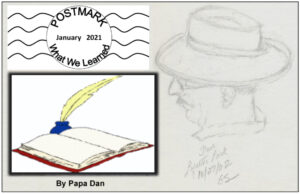Archive for Politics
Falling Down
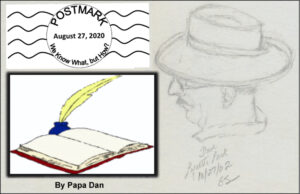
Let’s take a look at an old joke,
an old, crude and insensitive little joke,
and see if it applies to a current feature
of our American Democracy.
Falling_down_FINAL_BREL_Aug272020
= = = = = = = = = = = = = = = = = = = = = = = = = = = = = = = = = = = = = =
An Announcement
The scene is a large office building — the headquarters of a large national corporation. We see one, wide, uninterrupted floor of this office building containing several dozen cubicles and desks where people are working at their jobs. A voice comes over a loudspeaker and fills the room:
“Ladies and gentlemen, may I have your attention please? It has come to the attention of management that some employees who are dying on the job are failing to fall down. As a result, given the nature of our workforce, it has become difficult for management to distinguish between employees who have died and those who are still working. Therefore, beginning immediately, employees who die on the job are instructed to fall down. This action will contribute significantly to our ability to assess our productivity and make necessary management decisions. Thank you. That is all.”
Applying the “Joke”
So, what does this rude and insensitive little story, have to do with the state of our American Democracy?
Since the early history of our “great American experiment in democracy,” the United States of America has organized itself into political parties. The Founders did not intend it to be so — parties are not mentioned in Hamilton’s “Federalist Papers” nor in the Constitution — but it happened anyway. They haven’t always been the same parties — some parties have come and gone as they became irrelevant (remember the Whigs and the Tories?); some have changed their names (recall the “Federalists” and the “Democratic Republicans?”); and throughout our history some citizens have declared themselves to be independent of those parties. But over my lifetime, American politics and government have been structured predominately by two competing political parties that have populated most of the positions of power and influence in our national decision-making. One is called The Democratic Party and the other is called The Republican Party. Both parties have long stood for a common set of values, broadly recognizable as American values, as initiated by the Founders, values that have kept the nation together over the past century or so since the Civil War. In that respect, the two parties have a lot of historic similarities. The differences between those parties have largely centered on the policies and strategies they have preferred in pursuit of those values. Most often, national decisions have been made with more-or-less respectful debate, persuasion based on regional interests, compromise (only possible because of the common values I mentioned), and voting.
Today in America, however, the party that calls itself The Republican Party has died. It has died, but it has failed to fall down. As a result, there are still large numbers of citizens who believe that The Republican Party still exists. But it does not. It has died.
Growing up, I accepted my father’s assertion that “We are Roosevelt/Kennedy Democrats”— and I still do. However, well into my thirties, he and I knew and respected a number of Republicans. For them, if they are still alive and remember, their party has died. There was no funeral and some Americans mistakenly believe that it still lives.
OK, so that is a dramatic assertion, which some may not accept. I understand that. So, how do we test that assertion? How does a person notice that The Republican Party has died? All my life, certainly since I was in high school, the Republican Party has stood for at least these 7 consistent values:
1. preserving American institutions,
2. supporting fiscal conservatism, defined as a federal budget balanced between income and expenditures (i.e., opposition to “deficit spending”),
3. supporting small business (evident in consistent support for local Chambers of Commerce),
4. maintaining strong international alliances in support of global economic strength and American foreign policy objectives like reciprocal trade and fierce opposition to foreign dictators (especially those in Communist Countries) all in support of international peace and stability,
5. basing policy decisions on science and academic excellence by supporting and consulting experts,
6. supporting reliable safety-net programs to ensure a minimum, decent standard of living for Americans
7. actively promoting the value of common sense.
Those have been the fundamental values of the Republican Party since I was in high school, as confirmed repeatedly by spokespersons for that party. Those have long been called “Conservative” values. An observer will notice that those who claim to speak for the Republican Party today no longer stand for those values. Consider these observations on those topics — members of the Republican Party have advocated for the following things in very recent years:
1. They have worked very hard to diminish the effectiveness and credibility of long-standing government institutions such as the Justice Department and immigration authorities, criticized “so-called judges” of the federal courts who have ruled against Republican policy decisions, and depleted the ranks of long-standing institutions that have provided policy stability such as the State Department, Environmental Protection Agency, Postal Service, and Department of Energy.
2. They have proudly and repeatedly handed out large tax cuts for the wealthy blatantly causing budget deficits.
3. They have openly supported interests of the largest corporations, knowingly endangering the viability of small businesses, with tax policy and a willingness to renege on legitimate debts and agreements.
4. The current Republican Administration has repeatedly demonstrated deference and support for foreign dictators (e.g., Russia) who have shown a disregard for established national boundaries and attempted to undermine American elections. Republicans have resisted efforts to defend against those threats, undermining investigations and weakening alliances the nation has relied on for decades.
5. They have rejected science, denying well-established scientific knowledge like the effects of our energy choices on destructive changes in the global climate — actually subsidizing corporate polluters! Under the current Republican administration, America is the only nation to withdraw from the Paris Global Climate Agreement.
6. They have slashed long-standing safety-net programs, cast dozens of votes attempting to take away health insurance from ordinary Americans, resisting and demeaning long-standing progress in the rights of women, and unravelling campaign finance regulations to give billionaires outsized influence over all government decision-making, while systemically attacking voting rights to make it harder for the young people, minorities, and the poor to vote.
7. They have thrown common sense to the winds by embracing wild conspiracy theories, like the health threat from windmills, widespread voter fraud, the fabrication of climate change by the Chinese, the credibility of certain birth certificates, (and more), despite public evidence to the contrary.
As former President Obama summarized in a speech in 2018, this Republican behavior is “not conservative. It sure isn’t normal. It’s radical. It’s a vision that says the protection of ‘our’ power and those who support ‘our’ party is all that matters, even when it hurts the country. It’s a vision that says the few who can afford a high-priced lobbyist and unlimited campaign contributions set the agenda. And over the past two years, this vision is now nearing its logical conclusion.”
The conservatism that guided the Republican Party of my youth is gone. Yes, the Republican Party has died. Believe it or not, the seeds of that death were planted during the first term of the Reagan administration (check out his huge budget deficits: $195 billion in 1983, $180 billion in 1984 – look it up). Reagan’s “Conservative” administration also undid restrictions on Saving and Loan institutions, leading directly to the S & L crisis and slashed federal mental health funding precipitating today’s homeless problem.
So, what has replaced this now-deceased political party? Those who currently call themselves Republicans have embraced the politics of “resentment, division, and paranoia” instead of what we used to understand to be “conservatism.” Fiscal conservatism, of course, has become an often-invoked myth. The values to be preserved are power and influence.
What To Do
The dead-but-still-standing Republican Party, needs to be replaced by a large group of people who have a genuine interest in governing. I suppose, the problem could be described simply as a vocabulary issue. It seems that Republicans no longer understand the word “govern” to be a verb — that is, something that you DO. For some time, they have only recognized the word “government” — a noun that they utter bitterly as if it were a cuss word, pronounced either before or after spitting, as in “government regulation, ptieuuw!” They failed to learn (it was in the fifth grade), that the phrase “government regulation,” was one of the central purposes of government, as established by the Founders, to protect citizens against threats that they cannot fight individually. Over thousands of years, that phrase, “government regulation,” has been the single dominant characteristic that has distinguished uncivilized disorderly collections of people from what historians and anthropologists call “civilization.” To answer the “what to do” question, there are three steps (there are always three):
Step One: the election of 2020 — A large Democratic Majority must be elected in both houses of Congress and in State Legislatures and City Councils across the country to replace the mythical and deceased, Republican Party of old. This must be accompanied by restoration of confidence in the integrity of elections — an effort to be pursued in parallel with Step One.
Step Two: A Democratic President must be elected in 2020 while simultaneously preserving and expanding the Democratic majority mentioned in Step One. Then, the challenge will still be immense. There will be a lot of damage to repair from years of cowardly fake conservatism (known as “Trumpism”) and the weak national response to Trumpism that made it possible.
Step Three: The utter completeness of the Republican defeat must be accompanied by a movement to re-establish traditional conservatism as the bedrock of a new party with a new name — how about “The Grand New Party.” That party needs to sit down across a table with Democrats and re-engage in the business of governing. They need to reassert a set of values that would be recognizably American and taught in public schools (well-funded public schools, by then) as principles we can all pursue together with our own regional flavors. Oh, by the way, elected representatives of the Democratic Party need to be rejuvenated (OK, replaced) with folks with a commitment to the future in addition to their commitment to the values of the past. If you want to read that to mean “replaced by younger folks,” go ahead.
So, our question: Can all this be done in this generation?
My answer: Nope. Clearly, my generation (the “Post-War Baby Boom”) has had its chance to make a difference and gets mixed reviews. We made some progress in the 1960s, but my generation also brought us all some pretty awful outcomes, in spite of a handful of promising leaders. So, my answer is No. Given who we are, collectively, and HOW we have been approaching this problem, it’s not going to happen. But I suppose we can start with Step One and Step Two today, so my grandchildren’s children can have a place to start.
But Wait —
We described a serious problem and proposed a challenging “What To DO” to solve it. BUT, in assessing whether we can accomplish that goal anytime soon, is it possible that we have left out the most important question:
How?
Maybe it will take a dramatic, but simple, answer. Can we supply the simple human ingredient that has been missing from our politics and governance? Maybe that answer can come from a song from the 1960s (OK, an approach my generation has offered many times). Here it comes –
the climactic final song from an important musical from the late 1960s, which I had the privilege of seeing on the stage twice: “Jacques Brel Is Alive and Well and Living In Paris.” Translated from the French by Eric Blau and Mort Shuman, the lyrics (below), offer a solution. Sounds simple. Take a look at the lyrics and consider whether it is useful here in the 21st century. If we only …
If We Only Have Love
If we only have love
Then tomorrow will dawn
And the days of our years
Will rise on that morn.
If we only have love
To embrace without fears
We will kiss with our eyes
We will sleep without tears.
If we only have love
With our arms open wide
Then the young and the old
Will stand at our side.
If we only have love
Love that’s falling like rain
Then the parched desert earth
Will grow green again.
If we only have love
For the hymn that we shout
For the song that we sing
Then we’ll have a way out.
If we only have love
We can reach those in pain
We can heal all our wounds
We can use our own names.
If we only have love
We can melt all the guns
And then give the new world
To our daughters and sons.
If we only have love
Then Jerusalem stands
And then death has no shadow
There are no foreign lands.
If we only have love
We will never bow down
We’ll be tall as the pines
Neither heroes nor clowns.
If we only have love
Then we’ll only be men
And we’ll drink from the Grail
To be born once again.
Then with nothing at all
But the little we are
We’ll have conquered all time
All space, the sun, and the stars.
— 1968 — Original soundtrack audio: https://www.youtube.com/watch?v=M9ILw3D5yrU
![]()
Reflections On Change — It’s Fall, Right?
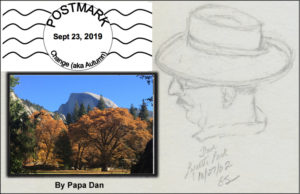
“One cannot make the words too strong.”
— Mark Twain
Click here to download a PDF of this post: Its_Fall_Change
It’s Autumn (aka Fall)
This year, Autumn begins on Monday, September 23 and ends on Saturday, December 21, here in the Northern Hemisphere. During this season, daylight hours become noticeably shorter and the temperature cools considerably. It is also the time when crops and fruits become ready for harvest. In English jargon, over time it has come to be known as The Fall because most leaves fall to the ground and change the color and texture of the landscape dramatically. As a result, all of this change provides great beauty to see in the Fall; and each region has its own style.
Vermont through a windshield—Fall 2013
 Now, some people will tell you that you must travel to New England to see “Real Fall Colors.” OK, Gretta and I did that in the Fall of 2013 just to see the colors and — OK — they do know how to do colors in the northeast when Summer turns to Fall. Vermont, New Hampshire, Connecticut, even Maine, did strut some colorful stuff. BUT, while that experience was spectacular, I’m here to tell you (among other things) that you don’t have to travel to the Northeast to see “Real Fall Colors.” Let’s not forget that we live in California.
Now, some people will tell you that you must travel to New England to see “Real Fall Colors.” OK, Gretta and I did that in the Fall of 2013 just to see the colors and — OK — they do know how to do colors in the northeast when Summer turns to Fall. Vermont, New Hampshire, Connecticut, even Maine, did strut some colorful stuff. BUT, while that experience was spectacular, I’m here to tell you (among other things) that you don’t have to travel to the Northeast to see “Real Fall Colors.” Let’s not forget that we live in California.
So, whadda We got?:
— In southern California, the most notorious source of “Fall colors” is the Black Oak, which turns its leaves to a nice golden yellow.
— In northern California, right here in the Bay Area, big-leaf Maple trees are famous for showing off their gigantic deeply reddened leaves before they fall to the ground.
— Farther north in Humboldt County, we see Oregon Ash, Dogwood, Red Alder, White Alder, Cottonwood, and (watch out!) Poison Oak. Each of these is spectacular and, when you can see them all at once … Whoa! … there are no words …
— In Shasta County, especially around Burney Falls, you can see ALL of those plus Vine Maple, Buck Brush, Deer Brush, Red Flowering Currant, and Squaw Bush — all turning from various shades of green to a profusion of reddish, orangish, yellowish, and brownish hues.
— AND THEN there’s the wine country(ies) throughout California, … as the grapes sweeten for harvest and prepare themselves to become the best wine in the world, the vines and ground cover can fill your eyes with multiple shades of greens and reds and even blues and yellows … well … OK, so you’re going to tell me that it doesn’t make sense to try to describe the dramatic changes that happen in the Fall with words, and you’ll be right. AND THEN, you’ll tell me that showing just one picture, or even two, as examples of this phenomenon will fall miserably short of the task. Below — First: Fall Colors in a California Vineyard — Second: And Up Close.
But, well, you gotta look at some colors before we talk about this subject some more.


So, before we continue, you may ask, what exactly is the subject? Is it really about the colors? Or is it about the only constant we can be sure of in this world — change.
Change Is Gonna Come — Oh, Yes It Will
Of course, all of these magnificent colors appear and the leaves fall to the ground because they are dying. Dying. You know, the living things that grow out of the Earth bud and blossom in the spring, they live their lives all summer, and then they die in the Fall. They must die because the trees and vines must shed their growth, spend the Winter in a comatose state — also known as hibernation, suspended animation, … uh … you know, “death” — so they can be reborn and come back to life in the Spring. But, we have to rake up the dead leaves first — And make no mistake, they are dead. Those are the rules.
It’s about change. It’s about change that must happen. But you knew that …
So, We Look to the Poets
Our poets go out of their way to move us past the obvious and convey to us more than the appearance of stunning changes like those we experience in the Fall; they are inspired by the cool fresh air and the end of oppressive inland heat; they celebrate the wonderful produce of all of that struggle (especially in wine country); AND, they also spend some effort marveling at the “terrible beauty” of the cycle itself — birth to life, life to achievement, achievement to beauty, beauty to death, and death to rebirth. Each of these steps must follow from the steps before them. So, often, poets are trying to reveal how all of this inevitable change feels for us humans and what expectations those feelings generate. So, how do we humans experience change?
Let’s ask some of our poets about change, through eyes that view the colors of the season:
- In this one, a young Shakespeare seems to focus on the sense of loss that Fall brings.
That time of year thou mayst in me behold — Sonnet #73 by William Shakespeare
That time of year thou mayst in me behold
When yellow leaves, or none, or few, do hang
Upon those boughs which shake against the cold,
Bare ruined choirs, where late the sweet birds sang.
In me thou see’st the twilight of such day
As after sunset fadeth in the west;
Which by and by black night doth take away,
Death’s second self, that seals up all in rest.
In me thou see’st the glowing of such fire,
That on the ashes of his youth doth lie,
As the death-bed, whereon it must expire,
Consumed with that which it was nourish’d by.
This thou perceiv’st, which makes thy love more strong,
To love that well, which thou must leave ere long.
- Next, Robert Frost appreciates the colors of the season, but laments the loss that follows.
Nothing Gold Can Stay by Robert Frost
Nature’s first green is gold,
Her hardest hue to hold.
Her early leaf’s a flower;
But only so an hour.
Then leaf subsides to leaf.
So Eden sank to grief,
So dawn goes down to day.
Nothing gold can stay.
- In her book Time and Place, local poet Lauren de Vore reflects on the responsibility for introspection that comes with the expectation of change. In the chapter on Autumn, her sonnet Taking Stock identifies the change of Autumn as something much more than colors.
Taking Stock by Lauren de Vore
October is my time to introspect,
As like a gleaner following the scythe
I cull through recollection’s field and, eyes
Attuned to see, unflinchingly reflect.
It’s easy to tot up the obvious,
That never-ending list of tasks that should
Be done before the rains arrive and would
Were I, in this, not kin to Sisyphus
Th’intangibles are harder to appraise;
Did I come through for those who needed me?
Did kindness guide my words and honesty
My acts, or did I tread a selfish maze?
One must at times take candid look within
In striving for a life that’s genuine.
- Frank DeRose comes right out and tells us that Autumn is gonna bring important change that will matter very much to us humans, well beyond the colors we see around us.
To Change Autumn is the Season by Frank DeRose
Colors turn,
Leaves fall.
For everything there is a time.
Autumn is a time for change,
A time for being human,
A time to reflect
(On warm summer nights),
And a time to anticipate
(Fiery winter days).
We are human.
Ever-changing,
Ever-moving,
Endlessly.
We are autumnal beings.
Yellow with happiness,
Orange with warmth,
And red with anger.
Red with love.
Red with hatred.
We are as cool
As the crisp breeze,
And as warm
As the colors around us.
To everything there is a season,
For everything there is a time.
A time to lie complacent,
And a time for change.
Autumn is the time for change.
- And our dear old friend Mark Twain brings this Autumnal experience to a close by showing us, entirely with his words, the natural climax of the change at the end of Autumn — words that convey this miracle in ways that a photograph could never do. He shows us the New England ice storm that brings the Fall to its dramatic conclusion. In front of an audience one day, Mr. Twain, rambled on like this (it is my favorite paragraph in all American literature):
— If we hadn’t our bewitching autumn foliage, we should still have to credit the weather with one feature which compensates for all its bullying vagaries — the ice-storm: when a leafless tree is clothed with ice from bottom to top — ice that is as bright and clear as crystal; when every bough and twig is strung with ice-beads, frozen dew-drops, and the whole tree sparkles cold and white, like the Shah of Persia’s diamond plume. Then the wind waves the branches and the sun comes out and turns all those myriads of beads and drops to prisms that glow and burn and flash with all manner of colored fires, which change and change again with inconceivable rapidity from blue to red, from red to green, and green to gold — the tree becomes a spraying fountain, a very explosion of dazzling jewels; and it stands there the acme, the climax, the supremest possibility in art or nature, of bewildering, intoxicating, intolerable magnificence.
One cannot make the words too strong. — Mark Twain
So much for the changes that Fall brings. Along with all of these features, the coming of Fall can remind us humans, at least subconsciously, of the other kinds of change we come to expect — if we are optimists — or the kinds of change that we want to see, that we hope for, that we desperately need to see, that we may fear are out of our reach, as we look around at the disappointing world of the time in which we live.
- Among our poets, songwriters have expressed some of our deepest feelings. Speaking for many of his time (late 1964) and of our own who have grown up in hard times, San Cooke wrote a song that never quite made it to the top of the charts, but still insisted on optimism:
A Change Is Gonna Come by Sam Cooke
I was born by the river in a little tent
Oh and just like the river I’ve been running ev’r since
It’s been a long time, a long time coming
But I know a change gonna come, oh yes it will
It’s been too hard living, but I’m afraid to die
‘Cause I don’t know what’s up there, beyond the sky
It’s been a long, a long time coming
But I know a change gonna come, oh yes it will
I go to the movie and I go downtown
Somebody keep tellin’ me don’t hang around
It’s been a long, a long time coming
But I know a change gonna come, oh yes it will
Then I go to my brother
And I say brother help me please
But he winds up knockin’ me
Back down on my knees, oh
There have been times that I thought I couldn’t last for long
But now I think I’m able to carry on
It’s been a long, a long time coming
But I know a change is gonna come, oh yes it will
Experience Teaches; and We Must Learn
So, those of us who look around and see so much that needs to change, so many who desperately need those changes, and so many obstacles stacked up against those changes — what’s a person to do? It seems increasingly clear that it will not be enough to be an optimist, like Sam Cooke, and rest assured that “Change is gonna come — yes it will.” So, we wonder if there are things that some of us urgently need to be doing to bring the changes that the seasons will not bring on their own? Once again, we are reminded of the words of Edmund Burke:
“All that is necessary for evil to triumph is for good men to do nothing.”
A poet of our own time gave us some further advice: “BE the change you seek,” he said. So, we know from the experience of the Fall that change is inevitable. Nothing stays the same and for very good reasons. Some things must die to make way for other things that must arrive. But must we just wait for it like Sam Cooke? Edmund Burke taught us long ago that is the worst thing we can do, and history has proven him right. We can look around and see that some people are MAKING change happen that is seriously evil while we watch — change that unravels progress we thought we had made. Positive changes we thought would endure in the way humans treat each other are reverting to hatreds we had hoped were diminishing. Opportunities for people to raise their standard of living are receding before our eyes in our country — and we see people in power making that happen by their words and actions. Must we merely wait and watch them do their damage and hope for the best? OR, does the optimism of San Cooke carry responsibilities with it to change the course of change itself?
It happens in nature as well as in human behavior. In a world with a warming climate, the changes that come at the end of Fall will be disastrous — we can see it happening if we are paying attention — the necessary ice melts; the rainfall floods the fields instead of nurturing the crops; the bees required to pollinate everything are dying out; the colors are different.
The hard truth is that we know why those things are happening. We know which industrial human behaviors are causing those changes. Yes, it turns out that actually can control the change. If we just wait and watch, others will control the outcome. Some are actually valuing dollars ahead of human survival. How can we make change happen that we need, instead of allowing others to dictate the destructive changes that we can see coming? There’s work to do. We do need to BE the change we seek.
We’ve learned that we are not likely to be successful acting alone. We’ve been told — it takes a village; it takes unions; it takes a unified political party; it takes a committed nation, it takes partnerships and alliances that cross all kinds of borders. Forces that divide and impede our collective efforts must be recognized for the harm they bring and must be defeated. These are hard words; but they are the lessons we have learned.
So, Fall is the time to take stock of our behavior and take responsibility for the effect we have on the direction of change. We have seen what happens when we do nothing. It is not a mystery. We must help each other survive the Winter and bring on the Spring.
![]()
King Arthur for 2019

“Tell the story”
“Don’t let it be forgot”
— Arthur
…
Yet some men say
in many parts of England
that King Arthur is not dead.”
— Sir Thomas Mallory
(of Warwick?)
—————–——–Click here to download a PDF of this article: King_Arthur_for_2019_May26_2019
In dark times, we humans tend to seek assistance from some form of intervention — perhaps a knight on a horse — to save us from dangers we can’t overcome on our own. History is full of examples; and my personal favorite example is the legend of King Arthur. At its core, the Arthurian legend promises that British greatness is secure as long as its royal heritage endures. Several ancient sources contain the prophecy that the ‘Rightful King’ would reveal himself by pulling an enchanted sword from a stone. In those stories, the sword, a sword named Excalibur, had been embedded in that stone under a spell that awaited a person with enough moral courage and wisdom (and, of course, physical strength) to remove the sword and save his people at a time of great danger. In our most enduring source of Arthurian legend, Le Morte d’Artur (1485), Sir Thomas Mallory tells us that the prophecy said: “Whoso pulleth out this sword of this stone, is rightwise king born of all England.” When that ‘Rightful King’ shows up to remove the sword, they were assured that he would lead his people to victory and guarantee their long-term stability. Arthur arrived on the scene to fulfill that prophecy in the sixth century. Presumably, all of Britain’s history follows from that moment. For centuries, many storytellers have taken up the legend — recently Alfred Tennyson in Idylls of the King (in the 1860s), T.H. White in his popular book The Once and Future King (1958), and, of course, the Broadway musical Camelot by Lerner and Loewe (1960). You’ve heard the story, right?
Most of the stories come to us from the 12th thru 15th centuries, with tales of chivalry, Knights of the Round Table, and a famous Camelot love triangle involving Arthur, Guinevere, and Lancelet; but the real, historical Arthur — and there actually was one — arrived on the scene to remove the sword and save his comrades at the Battle of Camlann in 560 AD. In that battle, Arthur, with the help of the sword, Excalibur, killed their enemy, Mordred, to achieve victory. Unfortunately, accounts from that time record that Arthur was mortally wounded in that battle and was taken by the sorcerer Merlin to the Isle of Avalon to die. Historically, most believe that he was buried in the churchyard at Glastonbury Abbey (below).

BUT Arthur’s story doesn’t end there. Mallory continues: “Yet some men say in many parts of England that King Arthur is not dead, but he was taken by the will of our Lord Jesus into another place; and men say that he shall come again, and he shall win the holy cross.” The legend provides further reassurance — we are told with the particular certainty of such powerful legends, that Arthur still waits at the Isle of Avalon (now known as Glastonbury Tor) for the day when his particular combination of greatness, goodness, and magic will be needed to save Britain again from great danger. Now, partial disclosure, I have visited Glastonbury Tor here in the 21st century in October of 2003. I have walked its full extent (I have pictures, below), and I must report to you that I did not see him there. But, the legend has endured long enough and forcefully enough to suggest that I must have missed him. I can tell you from my observation, there’s magic afoot on that hillside; so, we can be confident.
 Glastonbury Tor, 2003
Glastonbury Tor, 2003
So, the legend endures. (And it’s a good story, no?)
Over the centuries since that day, Britain has survived a long list of well-documented threats;
—> —> BUT today, the time for his return has clearly arrived.
Without Arthur’s intervention, Britain may be approaching a defining ‘point-of-no-return’ if it goes through with The Brexit, its planned separation from the rest of Europe, which will precipitate disastrous results for the British economy and the stability of Europe and the West. The entire arc of history enfolding from the 6th century to the 21st has been a constant struggle to unify and stabilize Europe under strong values and alliances. That struggle has continued through an alternating series of triumphs and setbacks over sixteen centuries. We’ve seen: destructive wars, expansions of a vast British empire, contractions back to a single small country, demonstrably less worthy kings, tasteless food, a few embarrassing prime ministers (that is, most of them since Churchill), and one worthless one (the current one). Arguably, the establishment of the European Union in 1993 was the greatest single step in the progress toward Arthur’s Round Table, as told to us by a succession of storytellers to our present day. The decision is now in the hands of the current British Parliament and the Prime Minister. If this Brexit decision goes the “wrong” way, and Britain shrinks from the responsibilities of its destiny, neither Britain nor the European Union are likely to recover from such a setback. The British people will need all of the wisdom and courage that Arthur, the “Once and Future King,” can provide to step back from the Brexit cliff.
So, the time has come, Arthur, to return and fulfill your destiny. The world still waits. I’m sure you are ready and waiting somewhere on that hill in Glastonbury. Time is running out.
Or, … maybe there is another way to think about this …
According to one version of the story, on the eve of battle, Arthur gave a gift to the future
(i.e., us). He was mindful that the battle was not certain to go well, that he might not survive, and his Round Table could die with him. As he brooded over that bleak future, he was startled by a young boy who had come to fight in the battle. The boy told Arthur that he wanted to fight in the battle to preserve the values of the Round Table. The dejected King, feeling that his life’s work was about to come to nothing, was skeptical, and asked the boy how he could possibly know about the Round Table. The boy told him, “from stories people tell — stories about might for right, right for right, justice for all, a round table where all the knights would sit.”
Arthur was encouraged by what he heard and, using Excalibur, he knighted the boy, Sir Tom of Warwick, and gave him these direct orders:
“You will not fight in the battle, you will run behind the lines and hide until the battle is over; you will return home to Warwick — ALIVE! You will grow up and grow old. For as long as you live, will you remember what I, your King, tell you and will you do as I command?”
“Yes, my Lord.”
Arthur then commanded him to tell the story, strong and clear, of the values of the kingdom he had hoped to create. “Don’t let it be forgot,” he said. (Click on the link to hear Arthur tell the story himself.) As the newly knighted Sir Tom of Warwick left to fulfill his orders, Arthur’s optimism is revived that “We will be remembered” and THAT would be his victory.
So, perhaps as the Brexit decision unfolds over the next few weeks, the story must be told, “strong and clear,” again and again, that Britain has an important role to play in the future of Europe and in preserving the values for which Britain, and Arthur’s Round Table, were founded. Maybe the telling of the story can tip the balance, even if Arthur himself does not emerge from Glastonbury Tor with his sword to save Britain from itself. Maybe the telling of the story is all that is needed. Maybe that is the lesson we must take from the legend:
à if the guys with swords let us down, let’s put our faith in the storytellers. Maybe the storytellers can influence the outcome, even today.
… … An afterthought — if Arthur can save Britain from itself, so you think he can jump across the pond and save US from … well … oh, nevermind.![]()
Is America Ready for the Twenties?
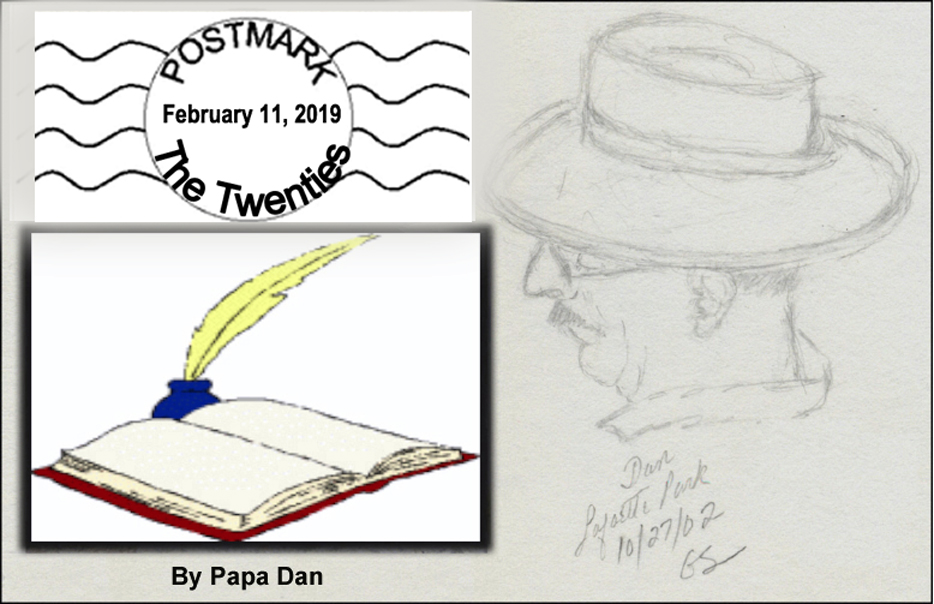
“The definition of insanity is doing the same
things over and over again,
but expecting different results.”
— Albert Einstein (100 years ago)
============================================================
Now that we have turned the calendar into January, America stands on the threshold of a new decade: “The Twenties” — that is, the 2020s. Over my lifetime, we Americans have a habit of naming decades, mostly in retrospect, for the attributes that were remembered by the generations that follow. Let’s quickly review the decades of the previous century:
• 1900 to 1910 – often called by American writers “The Good Years” — This was a time of peace, optimism, strength, and increased productive immigration
— my unskilled, impoverished, and illiterate grandparents came to America during this decade.
• 1910 to 1920 — Often called “The Teens”: featured War throughout Europe, widespread suffering, less immigration to America.
• The Nineteen Twenties — called “The Jazz Age” or “The Roaring Twenties”): featuring the odd partnership of Prohibition, alcohol, Jazz, and, well, “roaring.” We’ll comeback to this one.
• The Nineteen Thirties — called “The Great Depression” started with the Stock Market crash, and led directly to unemployment, hunger, and the rise of Nazis in Europe.
• The Nineteen Forties — the first half is called World War II, featuring isolationism and then war, the second half of the forties has been called “The Seeds of Prosperity”:
— that featured optimism and growing stability.
• The Nineteen Fifties featured “The Cold War,” and “Prosperity for Most of Us”: it was the stability that I grew up with — stability for most of us.
• The Nineteen Sixties — came to be called “The Age of Aquarius”: a combination of dashed optimism, racial/generational tensions, and the Vietnam War. These were my teenage years.
• The Nineteen Seventies — called “The Me Decade” featured Watergate, individualism, a monumental oil crisis, Middle East violence, and withdrawal from Vietnam.
• The Nineteen Eighties — was called the era of “Fact-Free Politics”: featuring Middle East wars and a historic redefining of “conservatism.”
• The Nineteen Nineties — WSJ and NYT famously named it “The Best Decade Ever”:
it featured the rise of Internet, a strong economy, multiculturalism, and then … well, the emergence of the “politics of personal destruction” and lots of small wars.
• 2000 to 2009 ‑ “Rise of Terrorism and Great Recession ”: 9/11, a mis-directed military response to 9/11, attacks on civil liberties, a recession, fiscal stimulus, and financial regulation.
So, last month we just completed the decade of 2010 to 2019 — What-am-a-gonna-call-it?:
This decade has featured near bankruptcies of whole countries — AND lots of disasters (e.g., disastrous earthquakes; disastrous tsunamis, floods, fires, and hurricanes; and disastrous elections). It also turned out to be the hottest decade on record — by far — leaving the largest number of burned square miles in history all around the world. Recently, writers in the New York Times have called this decade just ended “The End of Normal,” “The Decade of Disillusionment,” “and “Trying to Remember What It Was Like to Be Happy.”
It’s early, but I think of this decade just ending as simply the decade between all of that stuff we have just listed; and the inevitably monumental Twenty Twenties that lie ahead of us. So, I will call it “The Tweens”; but we’ll have to wait and see if that sticks. Nevertheless, the question hanging over is today is:
— “Are we ready for the coming Twenty Twenties?” Perhaps we should think about it.
So, let’s take a closer look at the last time we had a “Twenties” and see if there is anything about the 1920s that can hint at we might expect from the “Twenty-Twenties” to come.
The 1920s was named the “Roaring 20s” or “Jazz Age.” This decade began, inauspiciously, on Jan 16, 1920 with the onset of Prohibition. It is hard to fathom that the alcohol-soaked events of “The Jazz Age” could possibly have begun with a national decision to outlaw alcohol; but as Will Rogers famously said, “Prohibition is better than no alcohol at all.” An aside: my grandfather was a sharecropper in the Santa Clara Valley. He grew grapes and citrus during prohibition and, I was told, people came from miles round to buy his expensive oranges and he gave his homemade wine away for free.
The 1920s was considered “Roaring” because the younger generation rebelled against traditional taboos while their elders engaged in (what turned out to be) reckless stock-market speculation. The 1920s was also a decade of bitter cultural conflicts: religious fundamentalism, an anti-science movement swept the nation, and nativists battled against immigrants.
Does any of that sound familiar?
The 1920s also turned out to be a dramatic upsurge in technology (the emergence of flight, increased automobile use, dramatic spread of electricity). Sexual mores, gender roles, hair styles, and fashion all changed profoundly in the 1920s. The result was bitter clashes over such issues as foreign immigration, evolution, the Ku Klux Klan, alcohol abuse, women’s roles, and race.
Does any of that sound familiar?
Is there anything in those descriptions of the 1920s that one might suspect is waiting for us in the coming Twenties?
Let’s remember that the “Roaring Twenties” Didn’t End Well. The stock market crash of October 1929 brought a dramatic end to the prosperity of the 1920s — unemployment soared, Industrial production was cut in half, international trade fell off a cliff, and investment fell 98%.
The causes of the Great Depression included: the stock market’s dependence on borrowed money; weak purchasing power among the working class, and high tariffs that reduced international trade and contracted the money supply.
Does any of THAT sound familiar?
So, if the forces that led to the 1920s and the 1930s seem to be brewing in similar ways today, what outcomes might we expect to see in the Twenty-Twenties to come?
A Few Observations
— Worldwide population: is expected to explode to more than 8.5 billion people in the mid-2020s.
— Technology is expected to provide dramatic expansions of things like: Autonomous & electric vehicles, artificial intelligence, drones, 3d printing, renewable energy.
— The 2020s carry some predictions in society and politics:
- Remember that dictators in the 1920s targeted newspapers and journalists. Do you see any indications that “dictators” are attacking the news media today as we begin the coming Twenties? Media issues like Internet privacy, net neutrality, and the power of social media, seem to threaten to the survival of “Old Media?”
- Are we seeing the start of “First World” struggles like widening economic disparity, decreasing employment opportunities, decline in the numbers of well-paying jobs — The Amazon Effect?
- Are there violent international conflicts looming in the coming Twenties?
- Some predict changes in music (more streaming, more undefined styles, can Country Music endure? What about Hip Hop? Will anyone remember “Rock and Roll?”)
- What about predictions in Fashion (OK, right, how should I know?)
What’s the answer to our question – Are We Ready for the Twenties?
Those of us who live here in the 21st century think of ourselves as VERY DIFFERENT from those who lived a century before, in the 1920s. Yet, we can see that many of the conditions and behaviors taking shape today mirror the forces that led to the 1920s and 1930s. Will those forces inevitably lead to the repeat of those outcomes in the coming “Twenties? Or can we who claim to be “VERY DIFFERENT” people cause a different outcome?
Two questions emerge: Was there anything people could have done in 1919 to create a different outcome in the “Roaring” Twenties that were ahead of them? And for us, you and me — Is there something WE could do today to have an effect on the coming “Twenties?”
Some have joined groups marching in the streets carrying signs protesting a variety of things. Will that help?
Or should we take the opposite approach, as some are recommending, and avoid the news altogether and focus our attention on our own immediate local life, right here and right now?
— Of course, if we did hide from the news, we wouldn’t hear about the good things — people like 16-year-old Greta Thunberg, Cookie Monster’s appearance at Wrigley Field after 48 years, Michele Obama’s best-selling book “Becoming” (58 weeks on the NYT Top Ten list), UCLA gymnast Katelyn Ohashi scoring a perfect “10” on her floor routine, the increasing use and declining cost of solar and wind power, the European Union (and some states) banning single-use plastic bags, forks, and straws; the generous work of Chef Jose Andres’ World Central Kitchen, and lots of others doing big good things that we might become part of.
So, perhaps we shouldn’t hide our heads in the sand — we might miss the good stuff.
Is there a way to “become the change we seek,” as an old friend has recommended?
As Einstein suggested, shouldn’t we start doing something different if we expect a different outcome this time? I bet we can do it. If so, I suspect we better get started.
==================================================

Meditations On Walls
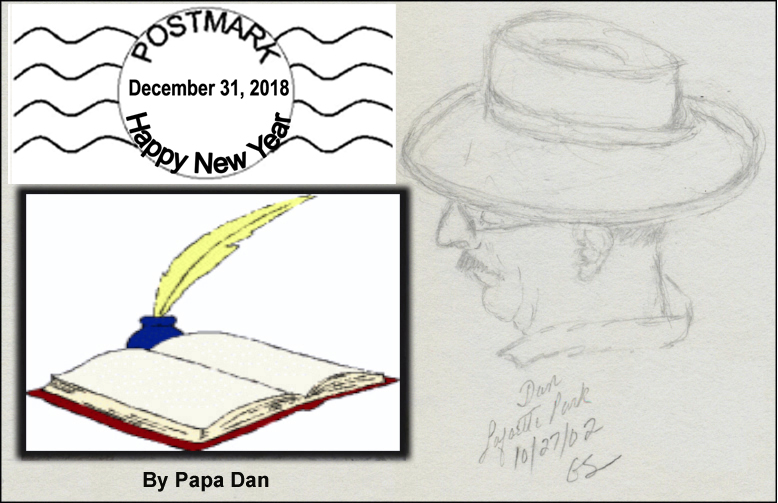
“Those who fail to learn from history;
are condemned to repeat it.”
— Winston Churchill (and others)
=============================================================
There have been many instances in human history when those in authority attempted to build large-scale walls, either to keep “dangerous” people out or to keep oppressed people in. A quick look at the history of such walls might serve as a guide to those considering the merits of walls in the today’s world. First, a general comment from Robert Frost — one of America’s foremost poets and observers of human behaviors and outcomes.

Next, let’s take a look at some famous “Walls We Have Known,” and see if there’s anything we might learn from them.
Walls We Have Known — History teaches that things generally haven’t gone well for wall builders
There are some common outcomes in the history of relying on large-scale walls for survival. Here are some famous examples:
• The Great Wall of China took centuries to build, kept a few nomadic invaders out at several locations, but didn’t prevent the large-scale invasions that actually changed the history of the region. It was 13,000 miles long, counting actual walls, trenches, hills, and rivers, and served as good lookout points. In the end, it was a moderate deterrent but not an impenetrable fortress that was intended. The famous large-sale Manchu invasion was successful because a Ming General decided to switch sides and let an army in.
• According to the story in the Old Testament, the Israelites defeated The Wall of Jericho by assembling an army of blowhards (they blew their trumpets and shouted). Prior to that failure, the natural hills surrounding Jericho were more effective. If the story is accurate, it doesn’t speak well for the effectiveness of walls. If the story is an allegory, perhaps that was the intended message.
• The Sumerians’ built their “Amorite Wall” during the 21st-century BCE to keep out the Amorites. It stretched over 100 miles between the Tigris and Euphrates Rivers in what is now Iraq. It succeeded for a few years, but after a single generation, the Amorites and Elamites defeated the wall by breaking through it in places or simply walking around it. As a result, while relying on the wall for survival, the city of Ur was destroyed around 2000 BCE and the Sumerian culture vanished from history
• Athens, one of the most powerful cities in ancient Greece, built a series of 100-mile-long barriers, known as “The Long Walls of Athens,” to create a siege-proof supply-line to the harbors of Piraeus and Phalerum around 461 BCE. It worked for a while during the Peloponesian War with Sparta, until their Navy was defeated and the Spartans dismantled it. In hindsight, it was the Athenian navy that protected the wall, rather than the other way ‘round. The wall was rebuilt and the Romans destroyed it again in 86 BCE. Turns out that the attackers of these walls thrived much better than either of the civilizations that built them.
• Around 122 A.D., Emperor Hadrian ordered a stone wall to protect Roman Britain from the “barbarians” of northern England and Scotland. Hadrian’s Wall was 10 feet wide, 15 feet tall, and featured a series of ditches and gates a mile apart. It enabled the flow of personnel and the collection of taxes, but ended up being mostly a symbol of Roman power, until Rome left the scene. After the departure of Rome, the “barbarians” from the north successfully overcame and dominated Britain anyway. The Wall, then, became more of a symbol of failure. Turns out that symbols can be dangerous.
• The Byzantine city of Constantinople (modern Istanbul) flourished for over a millennium thanks in part to its 14 miles of walls. The most famous, the Theodosian Walls, included a moat, a 27-foot outer wall, and a 40-foot-tall inner wall that was 15 feet thick. Troops on the ramparts rained arrows and a type of napalm called “Greek fire” on any enemy. The walls turned back attackers from the Arabs to Attila the Hun, but they were finally defeated in 1453, when the Ottoman Empire besieged the city with a new weapon—the cannon. After blasting holes in the walls, the smarter Turks poured through and captured the city, toppling the Byzantine Empire.
• The Berlin Wall, modern history’s most infamous wall, was erected to separate East and West Berlin in 1961. Communist leaders claimed the barriers were designed to keep out fascists and other enemies, but their real function was to prevent East Germans from defecting to the West. More than 100 people were killed while trying to escape through the maze of 12-foot walls, guard towers, and electrified fences. Thousands more defeated the wall, tunneling underneath it, and flying over it in ultra-light aircraft and hot air balloons. The “Wall of Shame” stood for 28 years before it was opened on November 9, 1989. Berliners celebrated, and demolished the wall with jackhammers and chisels. East and West Germany were finally reunified less than a year later in October 1990. The Wall became an international motivator for those who wanted to restore freedom. As a result, both East Germany and The Soviet Union have ceased to exist.
As you can see, in the long run, things typically don’t go well for wall builders and their people.
Humans have been persistent and clever in finding ways to overcome walls:
• Using common sense — that is by walking around them, digging beneath them, flying over them, or finding like-minded people on the other side to help them.
• Using technology — inventing canons, finding clever ways to pass under or through walls, crafting homemade devices to pass over walls, or using the wall-builders’ own devices and plans to defeat the intent of walls.
A Popular Definition Applies
Albert Einstein is generally credited for saying
this, but many wise people (i.e., non-wall-builders) have figured it out:
• “The definition of insanity is doing
the same things over and over again, but expecting different results.”
What Can Be Learned?
Winston Churchill (1948), quoted George Santayana (1905) when he said, “Those who fail to learn from history are condemned to repeat it.” So, those who might consider building a wall to preserve something that is important to them — either to keep something out or keep something in — might consider that building walls has a very poor track record in those efforts. History doesn’t look favorably on leaders who convince their people that walls were a good idea. Most didn’t survive to tell their story.
Perhaps there is another way …

Two Guys Speak To Us About Optimism (and other stuff)
<
“What can I do to make things better,
not only for myself, but other people?”
— Herbie Hancock
September 3, 2018
“Better is good.”
— Barack Obama
September 7, 2018
84-ConVivio_Hancock_Obama_speak
Herbie Hancock & Barack Obama
Let’s start with Herbie. Jazz enthusiasts of a certain age got to know about Herbie Hancock as a member of the Miles Davis Quintet in the 1960s. Since that time, he has played his piano with a distinguished list of collaborators with energy, enthusiasm, and inspiration. After winning twenty-some Grammy Awards, he is now at an age (78) when performers of “his time” have announced their retirement. BUT, it appears that “his time” still includes the present and the future — he just announced a new album and set of tour dates through 2019 (including one here in the Bay Area). OK, that’s the musical story. But in an interview with Aidin Vaziri of the San Francisco Chronicle on September 3, 2018 (read the complete interview), he had other stuff to say that extended beyond the music. With President Obama’s inspiring speech at the University of Illinois Urbana-Champaign still ringing in my ears from last week (September 7), Mr. Hancock’s answer to one of Mr. Vaziri’s questions got my attention. The question was about “optimism.”
Aidin Vaziri’s Question:
“Given the current climate of the country, are you able to remain optimistic for the future?”
Herbie Hancock’s Answer:
“Yes, because I can see past that part of it. What is happening now and showing its ugly head is not about just one person — namely the president — but with a lot of people that have fears. Fears breed anger. How that expresses itself in many cases is what we haven’t built into our human society, which is the ability to avoid looking for a scapegoat for our sufferings. There’s a tendency for human beings to always point at something outside of themselves. In many cases, there are things outside of yourself that are part of that equation. But it’s more important to take a broader view and realize that if something is happening to me and not other people, what can I do to make things better?”
“In Buddhism, we call that living a life of cause, not a life of effect. It’s easy to point fingers. It’s not easy to see how one is contributing to our own suffering. I think so much of that has been hidden under the rugs anyway. If you really want to clean house, you have to pull the rug back to see it.”
“Well, we’ve had the rug pulled back and now we can see it. What we have to do is not let it become a virus that spreads. We have to pour our compassion and understanding into that and use the best of our humanity to show there’s a better way to find a better life. It’s not the immigrants’ fault. It’s not the Jews’ fault. Or black people’s fault. Or Muslims’ fault. Or the Mexicans’ fault. Or whoever you may be blaming at the time.”
“You have to look first within yourself and think, ‘What can I do to make things better not only for myself, but other people?’ ”
Barack Obama & Herbie Hancock
From PapaDan:
On September 7, Former President Obama gave a formal address at the University of Illinois Urbana-Champaign (Read the complete transcript here.). The occasion was his acceptance of an Ethics in Government award. The audience included students and their families, faculty, and a national television audience. It was a preview of the messages he plans to deliver to the nation during the coming election campaign. He began: “Some of you think I am exaggerating when I say that this election is more important than any in our lifetime. Just a glance at the recent headlines should tell you that this moment is really different … the consequences of any of us sitting on the sidelines are dire.”
Observers described his speech as a “call to arms” to Democrats, especially of the younger generation, to do something they haven’t done in sufficient numbers: –> VOTE. But, I suggest that it was more than that. Still, the most widely reported themes from his speech focused on the dangers to our Democracy —trends in politics and government that threaten the values America has promoted around the world, the behavior of Republicans that have deviated from long-standing Republican values — like their historic opposition to communist tyrants, anti-deficit fiscal conservatism, and preservation of American institutions. “What changed?” he asked. To answer that question, he reminded the audience that only one in five members of the younger generation voted in 2016, and asked, “if you don’t vote, is it any wonder this Congress doesn’t reflect your values and your priorities?” Does it matter? He answered this question by reminding us that, when he was elected, he won some precincts by 5, 10, 20 votes — not percent, votes! Also widely reported was a host of specific criticisms of the Trump Administration and those who support it — on immigration, budget deficits, voting rights, gun violence, women’s rights, corruption ….
–> –> BUT, these are not the features of the speech that are ringing in my ears. The message in the speech that I hope everyone will take to heart, and the message that Herbie Hancock used to justify his optimism for the future of this country, is this — in Obama’s own words:
A key paragraph from Obama’s speech:
“Better is good. I used to have to tell my young staff this all the time in the white house. Better is good. That’s the history of progress in this country. Not perfect — better. The civil rights act didn’t end racism, but it made things better. Social security didn’t eliminate all poverty for seniors, but it made things better for millions of people. Do not let people tell you the fight’s not worth it because you won’t get everything that you want. The idea that, well, you know, there’s racism in America, so I’m not going to bother voting, no point, that makes no sense. You can make it better. Better is always worth fighting for. That’s how our founders expected this system of self-government to work. Through the testing of ideas and the application of reason and evidence and proof, we could sort through our differences, and nobody would get exactly what they wanted, but it would be possible to find a basis for common ground. And that common ground exists.”
“Better is good.”
The Path to “Better” — Observations from PapaDan
Even the important things we consider “better” are usually achieved in multiple steps, not in large, dramatic policy initiatives intended to change the world in one stroke. Changes in the behavior of our government, for example, would require multiple steps to address deficiencies in all three branches of government. That, in practical terms, would require multiple election cycles at all levels of society — starting with local governance upward to the national. It would also suggest significant educational efforts to restore attitudes and values across the generations — values regarding topics like immigration, race, public education, economic security, healthcare, and individual rights. History tells us that these values have been evolving in a fairly singular directional, albeit with alternating periods of back-sliding and recovery, within our social fabric over the past seven decades.
This past week, both the former president and the award-winning musician affirmed three essential messages (there are always three). 1) Progress comes as a result of building on “Better,” not giving up when we are likely to fall short of “Perfect.” 2) They also reaffirmed that a path to “better” must begin with the way we treat each other right now and right here, in our own neighborhoods and in our own families. Finally, 3) Both Herbie Hancock and Barack Obama carried one message underlying their words: Make a Difference. They both described ways we can do that and powerful reasons why it matters. In the final analysis, many of us are not sure that WE can make a difference. If we listen to the wisdom of these two guys, we can come to a conclusion we’ve heard before: Can we make it better? “Yes, we can.”
Optimism isn’t easy.
It isn’t sufficient (neither optimism nor jazz).
But both are required.
Oh, yes, and … well … by the way … vote.
–> And listen to some Herbie. <–
![]()
Trying To Make It Better

Hey, Jude, don’t make it bad.
Take a sad song and make it better.”
— Paul McCartney
Recently I wrote something called “Interruptions,” reflecting on the continuous drumbeat of tragic stories that emerge from the daily news. Every day, it seems, we hear another new piece of bad news piled on top of the unraveling stories of bad news from previous days. I read “Interruptions” in public at The Whistlestop Writers meeting here in the Tri-Valley. From the reaction, it seemed to have resonated with members of the audience. However, on reflection, I think even my central question — “What should I do about it?” — only made us feel worse about the things happening in our world these days. Gretta asked me, and I had to ask myself, “Was it a good thing to inflict such thoughts of harm and futility on my audience? Were they any better for it? Was I? Or did I just contribute to how bad we all feel about the world around us? One day’s bad news may distract us from yesterday’s bad news – or last week’s. More often, I fear, the accumulation of stories has a “multiplier effect.” In short, did I just make it worse?
Yep. Maybe so. I decided not to publish it on ConVivio.

So, the resulting “Writer’s Block” (pictured here) has me looking for something else to think about and something else to write about. So, here is a quick start — just a start. Just little things. It’s brief. We’ll see if this approach leads anywhere.
Some News That’s Not Bad
Caught on “smart doorbell” camera, kids return wallet with $700 inside.
http://abc7news.com/society/caught-on-camera-kids-return-wallet-with-$700-inside/3835550/
Small American town welcomes refugees with Southern Hospitality.
https://www.today.com/news/clarkston-georgia-home-thousands-refugees-t132421
There’s a new Alzheimer’s/dementia drug that’s showing promise in slowing memory loss in early clinical trials.
https://www.nytimes.com/2018/07/25/health/alzheimers-dementia-drug-treatment.html
A generous anonymous donor reveals her identity. She gave millions to artists without taking credit for the gifts.
https://www.nytimes.com/2018/07/20/arts/design/susan-unterberg-artist-grant.html
A British supermarker chain is introducing a “quieter hour” for autistic shoppers.
https://www.nytimes.com/2018/07/19/world/europe/uk-supermarket-autism-morrisons.html
An experiment with a four-day work week is a surprising success.
https://www.nytimes.com/2018/07/19/world/asia/four-day-workweek-new-zealand.html
Tourist accidentally pays 100 times taxi fare— driver tracks him down to return it.
https://www.goodnewsnetwork.org/when-tourist-accidentally-pays-100-times-his-taxi-fare-driver-tracks-him-down-to-return-it/
Riders of dirt bikes and all-terrain vehicles, illegal in most cities, have found a community.
https://www.nytimes.com/2018/07/25/nyregion/dirt-bikes-bike-life-ride.html
Recovering addict anonymously pays for ambulance crew’s breakfast.
https://www.goodnewsnetwork.org/recovering-addict-anonymously-pays-for-ambulance-crew-eating-breakfast/
Surprising solution: saving a country from wildfires with goats.
https://www.goodnewsnetwork.org/goats-the-surprising-solution-to-saving-a-country-from-wildfires/
There’s a lake of liquid water on Mars.
https://www.nytimes.com/2018/07/25/science/mars-liquid-alien-life.html

A mother duck is caring for 76 ducklings on Lake Bemidji in Minnesota.
https://www.nytimes.com/2018/07/24/science/merganser-ducklings-photo.html
Today, right now, across the world, something good is happening — whether or not we hear about it or acknowledge it as something good. And, as Walter Cronkite used to say at the end of The Six O’Clock News back in the 1960s, “And that’s the way it is.”
And, there’s more …
Your comments on this topic are welcome. ![]()
Today’s ‘New Renaissance’

“Eppur si muove” (and yet it moves)
– Galileo Galileo
“There must be some kind of way out of here,
said the joker to the thief.”
— Bob Dylan (“All Along the Watchtower”
sung by Jimi Hendricks)
Is it possible for ‘progress’ to be a good thing
and a bad thing at the same time?
— PapaDan
Click here to download a PDF of this post:
78-ConVivio_New_Rennaissance_May27_2018
= = = = = = = = = = = = = = = = = = = = = = = = = = = = = = = = = = = = = = =
Good News and Bad News
In their book “The Age of Discovery,” published in May, 2016, Ian Goldin and Chris Kutarna defined our current age as a “New Renaissance.” They observed that the forces at work during the period 1450-1550 in Europe (i.e., the “original Renaissance”) were very similar to the forces that are shaping our own time here in the 21st century.
During the “original Renaissance” (the one we learned about in school), Da Vinci, Brunelleschi, Columbus, Copernicus, the Medici, Galileo, Michelangelo, Luther — just to name-drop the top level of superstars of the time — shaped the western world’s understanding of, well, everything.
Newly acquired knowledge and capabilities changed the world through:
• scientific discovery,
• advancements in art and architecture,
• observations and predictions of the behavior of the universe,
• unprecedented global navigation,
• and new views of the relationship of humans to ““the church” (and, therefore, to God).
All these had significant effects on employment, manufacturing and distribution, wealth and poverty, political power, belief and behavior, health and longevity, life and death, and the structure of society.
Oh, yes, and one more thing — arguably the most significant thing — Gutenberg’s printing press. This invention made it possible for people everywhere to KNOW about all of those ‘Renaissance’ effects more quickly and cheaply than ever before and to acquire that knowledge UNFILTERED. Before the use of those small metal letters, oil-based ink, and flat white paper, knowledge was the primary possession of The Church, since it alone had access to The Bible and whatever other knowledge that could be transmitted by written language. Before that time, The Bible and other documents were produced slowly and laboriously in rooms full of monks who copied the text by hand with quill pens, creating the only copies of existing knowledge. Church leaders decided who could see those documents and controlled their contents. Gutenberg’s gizmo changed pretty much everything. The centralized ability to control knowledge and, therefore, to control people, began to diminish dramatically.
Looking back, most people have agreed that these developments — this rebirth and dramatic expansion of knowledge to “the masses” — represent the single greatest combination of human advancement and improvement in the lives of real people in the history of civilization.
Right?
And, of course, as the distribution of paper with little squiggly marks on it increased, it also enabled a dramatic increase in education of all kinds AND an expansion in the ability of people to participate in their governance and political decision-making. Those are good things.
Right?
The Rest of the Story (as Paul Harvey used to say)
Last fall, a column appeared in the Washington Post, written by David Von Drehle. In that piece, he made some simple observations and obvious comparisons that led him to a startling conclusion. He started with our Gutenberg story — how a goldsmith in Germany found a way to reproduce identical copies of important information and distribute that knowledge cheaply and quickly across the world without the control of the “main-stream media” of the time. He observed that nothing was ever the same after that invention.
So, what specific outcomes happened as a result of the use of the printing press? He reminds us:
• Lay people could own and read their own Bibles,
——-> The result was the Protestant Reformation
• Scientists could record their observations to share with other scientists
——-> The result was the Scientific Revolution
• Inventors could share their innovations with other inventors
——-> The result was The Industrial Revolution
• Philosophers could spread their ideas to activists
——-> The many results included one particular document written in a distant European colony that begins, “We the people of the United States, in order to form a more perfect union …”
So, does any of that sound familiar to those of us who are paying attention here in the 21st century? The comparison? Von Drehl asserted, “When Apple unveiled its first smartphone in 2007, the company sparked a communications revolution likely to be as transformative as Gutenberg’s. It’s the nature of such seismic change to shake the institutions of culture and society to the ground.”
So, what happened? The election of 2016 happened. Von Drehl observes that 2016 was the first American election truly dominated by mobile communication and social networking. As a result, information, the ideas that follow from that information, and the conclusions drawn from them were “set free.” This development has made the world a much tougher place for people who have derived their power and influence from an ability to control information, ideas, and opinions, — like the leaders of political parties. So, here comes Von Drehl’s dramatic conclusion:
Steve Jobs Gave Us President Trump
https://www.washingtonpost.com/opinions/steve-jobs-gave-us-president-trump/2017/09/05/f4f487e4-9260-11e7-aace-04b862b2b3f3_story.html?utm_term=.f61b89c59bd2
WHAT??!!!
Did Anybody Warn Us?
Anyone who makes even a cursory study of the process and logic that led up to the writing of the US constitution, finds some awkward words coming from the Founding Fathers. Much of the intent of the constitution derives from ideas found in The Federalist Papers, written by Alexander Hamilton and James Madison, with some help from John Jay, and the discussions that took place during the Constitution Convention of 1789. Much discussion at that convention centered around the need to avoid the pitfalls that had caused previous attempts at democracy to fail by giving too much power to “the people.” Here are a couple of excerpts:
- James Madison wrote in Federalist Paper No. 10: “In a pure democracy, there is nothing to check the [influence of] the obnoxious individual.”
- At the 1787 Constitutional Convention, Edmund Randolph said, “… in tracing the causes of past failures to their origin, every man had found [the causes] in the turbulence and follies of democracy.”
- John Adams said, “Remember, democracy never lasts long. It soon wastes, exhausts, and murders itself. There was never a democracy yet that did not commit suicide.”
- Chief Justice John Marshall observed, “Between a balanced republic and a democracy, the difference is like that between order and chaos.”
In summary — the framers of the constitution were afraid of democracy, the extent to which it gave power to “the people.” As a result, they wrote a number of provisions into the constitution to protect the government from the ignorance and poor judgment of “the people.” The electoral college, for example, was designed as a layer of protection to ensure that the people will not be able to directly elect a president, without the guidance and restraint provided by an elite group of leaders (like themselves). The reasoning — in the words of John Adams, “the people are likely to be easily brought under the influence of a demagogue if given unchecked power.” Wow, did THAT ever backfire! Similarly, the constitution, as originally adopted, provided that members of The Senate would be selected by the State Legislatures for that same reason — that the people are likely to make rash choices in difficult times without “adult supervision.” Similar features are found throughout the document, some of which were later amended.
So today
The mobile communication and social networking made available by the innovations introduced by Steve Jobs (and others) made it possible for “the people” to access unfiltered information — regardless how wise or spurious it may be — to persuade each other in ways that appeared authoritative, and to make decisions that may or may not be in their own best interests or in the long-term interests of the republic. Sounds like that is exactly what the founders feared.
So, here we are.
What do we do? Does this mean that we have overdone this ‘democracy’ thing in America? Is there something we should do to try to reverse some of its effects? If history is a guide— and it usually is — I’d observe that the effects of the “original Renaissance” were more or less permanent. So, perhaps, there’s no going back to a time when information could be owned and controlled? AND I think most of us would agree that we would not want to return to a time when an “establishment” could control information and knowledge — even if WE were part of that establishment. On the other hand, in a world of uncontrolled information, is there a way to give Americans the tools to recognize truth and wisdom when they see it and distinguish that from lies and foolishness? Well, on another “other hand,” is it possible that “the people” stumbled on some wisdom in the Election of 2016 that some of the rest of us are just slow to recognize? Is throwing out conventional wisdom and starting over a good idea? We look back fondly on that achievement when they did that during the “original” Renaissance — back in the 15th century and the times that followed, right? They overturned an oppressive and ignorant time and replaced it with some useful ideas. In the long run, it turned out pretty good for us, here in the future. Of course, it was pretty traumatic at the time for those who had to endure dramatic and disruptive changes, eh? There was a period of pretty serious disorder.
So, was THAT RENAISSANCE a good idea? What about THIS ONE? Is it merely a difficult time we must endure to get to a better time? Can we predict the long-term effects of the changes we are noticing today? What will “the future” think of what we have done? What will our grandchildren say when they are our age? Will they be proud of us?
What do you think?
So, I guess we’re still working on it. We’ll see. ![]()
.
The In Crowd

“You ain’t been nowhere
’til you’ve been in
with The In Crowd.”
— Dobie Gray (lyrics by Billy Page
Click here to download a PDF of this post: ConVivio_The_In_Crowd_Mar29_2018
= = = = = = = = = = = = = = = = = = = = = = = = = = = = = = = = = = = = = = = = = =
Last week, a friend of mine lamented the fact that some important content she was interested in was available only on Facebook, Twitter, and other social media. The bad news was that this content happened to be the marketing material from the publisher of her soon-to-be-released book. The problem, in her words, was this: “I don’t do social media and don’t intend to start!”
After some thought, I replied, “It seems to me that everyone assumes these days that we are all is hooked up to these social-media websites; and, if you aren’t, you don’t have a clue what’s going on. It’s like the new ‘In Crowd.’ “
And then a memory popped into my head — “Remember the song from back in the day …”
An Old Song Pops into My Head
Let’s drift back a moment to 1964. Every Saturday morning on radio station KYA, my favorite disc jockey, Emperor Gene Nelson, would count down the “Top 30 Hits” for that week. A lot of new songs were introduced on those Saturdays; and it was absolutely essential for us 14-year-olds to keep up with the latest music. High school was a big change for me. After eight years in the same school, in the same class with pretty much the same faces, the transition from being an 8th grader to being a High School freshman was intimidating.
My freshman class had ten times as many kids as my 8th-grade class had. I knew thirty-some kids and the rest of the 300-some kids in the Freshman class were strangers. But, even as a stranger, like other 9th-graders, I quickly realized that listening to the right music would be required to fit in to my new world. So, I listened carefully — to the Beatles, The Stones, The Supremes, Leslie Gore, The Dixie Cups, The Dave Clark Five, Dusty Springfield — to all the music Emperor Nelson played on KYA.
With all that in mind, one Saturday morning, The Emperor introduced a new song that got my attention. The song was “The In Crowd.” Coming from a school where I had always known everyone, the idea of an “In Crowd” was new to me. The big, bold voice of Doby Gray sounded like a voice of authority.
Here is what the song said:
The In Crowd
By Dobie Gray (recording released December, 1964); lyrics by Billy Page
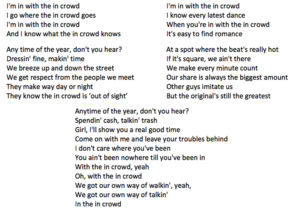
Not all of the ideas in the song were new. I already knew that some 8th graders were considered more “cool” than others (certainly more “cool” than I was); and “cool” usually meant exhibiting behaviors that other kids admired. I remember a friend of mine, Michael Savage, (who had an older brother who could teach him “cool”) showed up one day in the 8th grade with “a new way of walkin’,” like the song said. When he walked across the courtyard at school, with his slow, purposeful gait and aloof expression, he caught the admiring eye of those of us who were “less cool.”
So, back then, I suppose we 8th-graders had a sense that some of us were especially “in”;
but the following year when the song came out, to my 9th-grade ears, some of these “In Crowd” song lyrics revealed ideas that separated those who were “in” from the rest of us. Two examples:
First: it hadn’t occurred to me that some people “know what the in crowd knows” and presumably, those were things that I didn’t know, and
Second: apparently, the chosen few “go where the in crowd goes” and “if it’s square, we ain’t there.”
I wasn’t completely sure what “square” meant — except that I suspected that “square” included attributes that I probably had and included places that I went. (Uh, maybe places like the library or the store where I supplied my stamp collection? I suppose they were “square.”)
As I became more accustomed to high school, some of the lyrics were actually troubling:
the assertion that “our share is always the biggest amount” didn’t sit well with my teenage sense of fairness and I wondered, as an outsider, ‘what earned you that biggest share’ — other than trivial stuff like “our own way of walkin’ ” and “our own way of talking’.” The song assigned behaviors to those of us who were not in “The In Crowd” that I didn’t like:
They make way day or night
They know the in crowd is ‘out of sight.’
Who said I was going to “make way” for anyone?” On reflection (or what passed for ‘reflection’ in a 14-year-old), “Spendin’ cash, talkin’ trash” did not sound like something worthy of respect.
Evolution
As time went on, and this Freshman became a Sophomore, and so on, other bits of evidence confirmed my suspicion (and hope) that there were other ways to earn respect — things like getting good grades, succeeding at athletics, reading books, joining clubs, being a good friend, etc. The music continued to be important to me (and I learned to keep quiet about my Frank Sinatra and Tony Bennett records), but I came to realize that a narrowly defined “in crowd,” that merely imitated approved “cool” behaviors, was not particularly appealing. I considered that a person, even in high school, could be part of more than one “crowd.” One of my teachers had a sign on the classroom wall that I copied into my notebook. It said:
“They laugh at me because I’m different.
I laugh at them because they are all the same.”
Fast Forward to Today
So, as I mentioned, these “In Crowd” lyrics from 54 years ago did not spring into my memory out of nowhere. The pervasive nature of Facebook, Twitter, and other social media seems to have created a new “in crowd.” While digital media was originally promoted as being inclusive; in fact, the “In” and ”Out” feature of digital social media seems to have grown more exclusive. Has Facebook become a new “In Crowd?” We have learned lately that there are things we have to give up to be a member of that crowd.
Looking at this topic through the lens of today, I think we can hear these lyrics in The News that we hear every day. We seem to be surrounded by people who want us to believe that we must be members of a particular exclusive “in crowd” or we are not properly American. Some promote the idea that the survival of that American “in crowd” requires its members to exclude people who are different. Are we being fed an exclusive “In-Crowd-First” philosophy?
The optimist in me wants believe that the kind of exclusive “In Crowd” behavior we saw as teenagers of 1964 eventually disappears with age and is replaced with something more sensible and grown up. There is evidence, however, that my optimism may be naïve. Is today’s “in crowd” mentality growing rather than receding? Is it dangerous? How divisive can it get?
But, I do notice that some crowds are emerging with more inclusive intentions — crowds like “Enough is Enough” and “Never Again.” Some of the most articulate and welcoming spokespersons of those crowds are not much older than I was in 1964 and they are starting to emerge as the “grown-up” voices of our time. And the crowds, just last weekend, have been quite large. Do these “in crowds” offer just another short-lived “new way of walkin’ ” and ” new way of talkin’ ” as they did in my youth?
Or is something more enduring, more inclusive, perhaps more promising, on the horizon?![]()
The Winter Solstice: A Time for Review

“The Winter Solstice has always been special to me, as a barren darkness that gives birth to a verdant future, a time of pain and withdrawal that produces something joyful, like a monarch butterfly extracting itself from its cocoon.”
— Gary Zukav
“The Romans, like other [ancient] nations, had nature festivals celebrating the death of winter to the life of spring — the Winter Solstice, featuring the giving of presents, the lighting of a huge log, and the burning of candles.”
— Samuel L. Jackson
Click here to download a PDF of this post: 70-ConVivio_Solstice_Dec_2017
= = = = = = = = = = = = = = = = = = = = = = = = = = = = = = = = = = = =
New Realities Are Emerging
Perhaps, it is the time of year: The Winter Solstice — the shortest day of the year. Since ancient times, the days between about November 21st and the new year have signaled a time for review and thoughtful reflection. While I have tried over the past year to avoid writing about our corrosive politics, a few writers and a couple of thoughtful voices have offered a more dignified and insightful approach to our politics than we have seen elsewhere in the media. So, I thought I’d give it a try. Two writers are worth a look:
• Steve Israel wrote a column for CNN online called “Forget red vs blue states, this is the real battle in America”
• David Brooks wrote a piece in the New York Times on Nov.9 with the strange title,
“The Existing Democratic Majority”
(Click on the titles above for links to the original articles.)
Let me attempt to briefly extract the ideas that made me sit up and take notice.
1. In “Forget Red vs Blue,” Steve Israel makes a dramatic assertion: that the divided politics that became familiar to us during the Bush and Obama years have been utterly disrupted. For years now, we had come to understand that all political issues and government decisions revolved around the divide between Red States and Blue States. Regions dominated by Republicans supported a predictable array of policies and attitudes. Likewise, those dominated by Democrats also supported largely predictable positions. With very little overlap, decisions came down to vote counts along that divide. His analysis — today two very different groupings have emerged by which decisions are likely to be made. We can call them “parties” if we want; but the designations “Democrat” and “Republican” no longer adequately define them. Some call it a struggle between “populists” and “the establishment”; but those labels don’t tell the whole story either. Steve Israel described them this way:
a) “The Normicon Party” consists of people from both traditional parties who favor respect for civility, stable institutions, and recognized ethical expectations. Normicons try to subordinate immediate emotion to long-held principles. Using a sports analogy, for them, politics is like boxing: “They may not watch it, but they understand the point of its rules, referees, and judges.” They prefer to maintain what most would recognize as “norms”
b) “The Denormocrat Party” embraces strength through attack, assaults on institutions, and the flouting of rules and regulations (i.e., “De-norming”). Denormocrats are willing to suspend long-held ethical expectations for short-term emotional gain. For them, politics is like cage fighting: “They may not watch it, but they identify with its full contact and minimalist rules.” They prefer to discard what most people recognize as “norms.”
Normicons see stability through order. Denormocrats seek salvation through disorder.
A number of writers have used words like the following (from Ezra Klein) to describe the 2016 election: “In the recent past, our divisions have been Democrats versus Republicans, liberals versus conservatives, left versus right. But not this election.” This campaign is not merely a choice between the Democratic and Republican parties, but between normal political parties and an emerging abnormal one.
2. David Brooks, in his column on Nov. 9th, proposed another way to understand the emerging American political landscape. He suggested that the “Republican vs Democrat” divide is being replaced with something different. Voters are starting to sort themselves into two groups that he calls “Somewheres” and ”Anywheres.” “Somewheres” are people whose values and priorities are rooted in their location — like “Virginia farmers,” “West Virginia Coal Miners,” or “Pennsylvania steelworkers.” These Americans tend to live in rural areas, they tend to stay put, they are often uncomfortable with cultural change, and they tend to vote Republican. The bad news for them is that, in many of these rural areas, the steel mills and coal mines are gone or declining and are not quickly being replaced by industries that require similar skills. But, the people remain — perhaps because they don’t have the skills or the will to move. Anywheres, on the other hand, value educational opportunities; they move to the cities where their skills and education are in demand, and as a result are more likely to feel comfortable with diversity and cultural change. If employment opportunities change, they tend to move to get a better job. Anywheres tend to vote Democrat.
a) Until recently, this trend kept a political balance because, while the cities tended to vote Democrat and rural counties voted Republican, the suburbs were divided and provided the balance (aka gridlock) of recent years. BUT TODAY, the growing suburbs are no longer divided. As Brooks put it: the suburbs “are ‘Anywhere’ all the way through.” This has suddenly begun to play out in local special elections: Loudon County (went Demo 60-40) and Fairfax County (67-31) are examples. The outcome of the recent Alabama Senate election may be viewed in that category. Northern Virginia’s Bailey’s Crossroads recently experienced an influx of information-age workers and ethnic restaurants. –> This is new.
b) As a result, the political map is being redrawn. Brooks’ observation, borne out by other analysts, is that Trump supporters are not at home on this new playing field. He writes, “Populism has made the Republicans a rural party and given the Democrats everything else.” The data shows that, in Virginia’s recent example, “Democrats won by a landslide among anybody who grew up in the age of globalization. Among voters aged 18-29, they won by 69-30 percent. Among voters 30-44, they won by 61-37 percent.” He goes on, “The stain Trump leaves on the G.O.P. will take some time to wash away. But it is bigger than Trump; it’s an alignment caused by the fundamental reality of the populist movement.
c) BUT, does this translate into a Democratic dominance? “Not so fast,” he says. The Democratic Party has not reached this opportunity as a result of a winning strategy. This is happening because “the Republicans have decided to shrink their coalition.” Brooks predicts that, if Democrats bet their future on their relationships with wealthy donors, they’ll give it all back. On the other hand, “if they focus on geographic, social, and economic mobility, the age of Democratic dominance will be at hand.”
What to Expect
Notice that the writers we have examined didn’t conclude their work by telling us what the outcome will be. They did a thoughtful job of describing the conditions; but the outcome is yet to be determined. So, as with so many other elements of the nation’s future, here in the age of Trump, we’ll have to wait and see. It might be easy to assume that 2018 will return to what we have come to think of as “the natural political order.” But, there are reasons to be skeptical. At around inauguration time this year, a number of writers (notably Chris Cillizza, quoted below from the Washington Post,) have been writing things like this: “Trump’s ascension to the White House feels more like the beginning of something than the end of it to me. The instability of our long-standing institutions, coupled with the creeping anxiety … and a sense that the American Dream is fading away, creates a political climate in which nontraditional politicians promising the world hold massive appeal. In short: I think we’ll see more Trump-like figures in politics, not less. And that a return to some sort of ‘normal’ never really comes.”
So, if these writers, and others, are right, we may have reached a time when “normal,” as we have come to understand it, is a thing of the past. Our two most recent former presidents have expressed that view recently and emphatically.

In recent speaking engagements
on the same day,
Presidents Bush and Obama reminded us: “This is not normal.”

So What?
Now, before we panic, all of this analysis doesn’t have to be a harbinger of doom. It might be that, but it could be an opportunity for America to reshape itself into a different future. Let’s not forget that such “reshapings” have happened before — some with positive results and some not so much —the 1860s, the 1910s/20s, the 1940s, the 1960s, the 1980s, are examples. Those who were paying attention during those times (and writing about it) have told us that the outcomes were not easily predictable nor were they easily controllable by those in power. But one lesson to be learned from all of that history is that those who care enough to participate can have an influence on the direction America will take. Those who simply stand and watch, will probably be surprised at how unimportant their views were. As the Winter Solstice reminds us that the world is ready to remake itself once again, those who try to influence the outcome, especially in concert with others, may be surprised at how much influence is possible. –> This is not new.
And Now?
So, after the “reflection and review” that the Winter Solstice evokes, does the coming sunlight bring with it a call for action? But what kind of action and by whom? In a Democracy, we are told that our voices are the most effective tools. And in a Republic, we select representatives to increase the reach and volume of our voices. So, it would make sense to let those representatives know what kind of action we intend.
Some sample pathways:
https://www.feinstein.senate.gov/public/
https://www.harris.senate.gov/contact/
https://swalwell.house.gov/
https://govapps.gov.ca.gov/gov39mail/
Finally, I’d like to cite two more writers who have offered useful advice for this time. One is poet Annie Finch, the author of “Winter Solstice Chant.” In an interview, she reminds us of the two-step process of moving from darkness to light: “If you don’t experience the darkness fully, then you are not going to appreciate the light.” The other — a well-known and eloquent gentleman advised us once to “become the change we seek.” Might be worth a try in the new year.
![]()
Kristof’s Poetry Contest

“I would like to invite you to submit entries
to a new poetry contest meant to capture
the ethos of our times in verse.
… Let’s try to examine this historical moment
through a new prism” with this poetry contest.
— Nicholas Kristof, September 15, 2017
Click here to download a PDF of this post:
Kristoff_Trump_poetry_contest_SIX_Oct_2017
= = = = = = = = = = = = = = = = = = = = = = = = = = = = = = = = = = = = = = = = = =
On September 15, Nicholas Kristof invited readers to submit entries to a new contest in the NYT — his invite: “Announcing a Trump Poetry Contest” is found at: https://kristof.blogs.nytimes.com/2017/09/15/announcing-a-trump-poetry-contest/
Below are six entries sent to the contest by two local authors:
myself and Lauren De Vore.)
Below are Dan’s three entries to Kristof’s New York Times “Trump” poetry contest.
After those are three poems submitted by Lauren De Vore. As of October 8, it is unknown if any of these six poems were selected to appear in The Times. We’ll see …
• Consistent with the topic, my intent was to reflect on a distortion of the Presidency with a distortion of the sonnet form. Like classic sonnets, my entries are written in iambic pentameter, but, unlike those others, each has 20 lines (4-7-5-4) and no rhyme, just like this Presidency.
• Another objective: to fulfill contest requirements without mentioning a certain name.
— PapaDan
= = = = = = = = = = = = = = = = = = = = = = = = = = = = = = = = = = = = = = = = = =
What This One Hasn’t Learned
By Dan Sapone
A president presides but does not claim
all triumphs and achievements for himself.
He praises goodness that we’ve all achieved
together to become the change we seek.
My Dad’s advice: “Give credit and take blame”
was offered free to any who would lead.
“Lift up the folks around you when you speak.
Say not ’I’m great’; for if you are, the world
will tell YOU so; and you can humbly say,
“It’s WE who make the world a better place,
together all,” he adds, “Unless we don’t … ”
For then, true leaders know to change the path
and say, “Together, follow me this way,
and bring with us those needing helping hands,
for hands we have; and other hands we’ll need
when harder work will be required of us.
D’yathink that HE can learn what those before
him knew and brought with them to leadership:
that greatness lies only in “Us” and “We”
and not at all alone in “I” and “Me?”
= = = = = = = = = = = = = = = = = = = = =
Dancing on the Edge at the End of the World
By Dan Sapone
Poets’ve said a lot ’bout how it ends.
Said one: “Some say in fire, some say in ice.”
Another wrote we should expect the sound
to be “a whimper” only, not “a bang.”
So, on the edge, so near the end, we dance.
We’ve grown up thinking of a sudden end
to all we’ve known — a blast, a mist, then gone.
But those who watch may notice that a slow
decline precedes the end. A lack of care,
neglect of values writ in stone by those
who came before. They warned us loud and clear:
“Take care of those who need — we’re all the same.
Become the change we seek. Beware of those
who shout the loudest, those who wish to rise
by pushing others down.” But we forgot,
and looked away, while demagogues arose.
And so we dance, here on the edge. While some
will quickly pay the price of our neglect,
it’s all of us, in time, who’ll see it end.
Yes, all of us, in time, will see it end.
= = = = = = = = = = = = = = = = = = = = =
“In a democracy people get the leaders they deserve.” — Joseph de Maistre
(popularly misquoted as having originated with Alexis de Tocqueville and Abraham Lincoln)
The Leaders We Deserve?
By Dan Sapone
A coupla hundred years ago, a few
observers offered this enduring truth,
that over time, “In a democracy,
the people get the leaders they deserve.”
That begs some questions those of us who vote
must ask ourselves: Is THIS what we deserve?
What earned us this foul-mouthed incompetent
who represents us all around the world?
Can we of right say loudly “Shame on him”
or must we own it and say, “Shame on us?”
How can we know what is it we deserve?
Do we disparage those unlike ourselves?
Or welcome others with our minds and hearts?
Do we speak of each other with respect?
Do we contribute to a common good
to help make us into a better us?”
Perhaps our leaders mindlessly reflect
the image that our honest mirror shows.
Perhaps we must admit the painful truth:
We got the leaders who are just like us.
= = = = = = = = = = = = = = = = = = = = =
Lauren de Vore’s three submissions to Nicholas Kristof’s Poetry Contest
Below are the poems Lauren submitted. In announcing the contest, Kristof asked for poems that “capture the ethos of our times” and noted that “if you can make us feel better, or laugh, or think more deeply, so much the better.” As much as I would have liked to been humorous, I do not find the current ethos to be such that verse can make anyone feel better. Rather, my poems give voice to my disgust and despair over these Trumpian times as well as the moral responsibility those of us who disagree with the current Administration and Congress have to stand in resistance and as witness to this dangerous and damaging period in our nation’s history. As for thinking more deeply, by all means do so, but not at the risk of sinking into an abyss. One must have faith in the ability to change things for the better in order to fight for the better.
Directive for the 21st Century
by Lauren de Vore
Be not numb. Turn not away. Someone must bear witness.
Hone your nerves that you may be shocked, offended,
Outraged by the sandbox-bully meanness,
By the lies and the flag-waving god-invoked hate,
That you may be horrified, anguished, incensed
In the face of act upon act of violence
And the blood-lust glee of the perpetrators.
Shrug not. Retreat not into cynicism.
Someone must feel the pain.
Though you march not on the front lines of protest
Against those who would destroy
What they envy, what they fear
And torment the weak simply because they can,
Avert not your eyes and hope it will all go away.
Rather, stand unblinking,
Witness to the rending of a nation.
And when the land lies blood-soaked and torn,
Like a troubadour of old, tell the tales of the slaughters
And the resistance, of the villains and the heroes,
That some who survive the madness may listen, may learn.
Be not numb. Turn not away. Someone must bear witness.
* Written in response to “Truth, Lies and Numbness,”by Roger Cohen, The New York Times (August 24, 2017).
= = = = = = = = = = = = = = = = = = = = =
Masquerade
by Lauren de Vore
Drivel passing as profound Sound bites
proclaimed as wisdom Bluster and bullying
ranted as righteousness Lies hustled as
truth Hatred spewed as patriotism And
bigotry cloaked in the robes of faith
Even as Tolerance is scorned Compassion
mocked Otherness reviled Restraint and
reason Spurned and derided As weakness
As foolishness and naiveté
Yet who are the naïve The foolish, the weak
But those who refuse to see This masquerade
for the farce it is And wrapping themselves
in spangles and stripes Dance on the precipice
Of our undoing
= = = = = = = = = = = = = = = = = = = = =
AWOL
by Lauren de Vore
There is no “i” in country
There is no “u” in nation
There is no peace in poverty
Or hope in homelessness
No tolerance in tea parties
No grace in zealotry
There is no trace of humbleness
In hubris, not a shred
Of decency in demagogue
What future is there for
This grand experiment that’s U.S.
When hate and blood and fear
Run rampant in the streets
When politicians sabotage
The land they claim to serve
And super-PACs buy votes and laws
To feed their appetite for ever more
When body politic prides ignorance
And presidents toss covfefe
Into the swirling winds
But there’s an “I” in nation, “you” in country too
Perhaps one day the “S of A” will find again its “U”
= = = = = = = = = = = = = = = = = = = = =
America’s Great Anniversary Festival

“It ought to be solemnized with Pomp
and Parade, with Shows, Games, Sports,
Guns, Bells, Bonfires and Illuminations
from one End of this Continent to the other from this Time forward forever more.”
— John Adams, July 3, 1776
Click here to download a PDF of this post: The_Fourth_2017
= = = = = = = = = = = = = = = = = = = = = = = = = = = = = = = = = = = = = = = = = =
From a letter from John Adams to Abigail Adams, July 3, 1776
 “The Second Day of July 1776, will be the most memorable Epocha, in the History of America. … I am apt to believe that it will be celebrated, by succeeding Generations, as the great anniversary Festival. It ought to be commemorated, as the Day of Deliverance by solemn Acts of Devotion to God Almighty. It ought to be solemnized with Pomp and Parade, with Shows, Games, Sports, Guns, Bells, Bonfires and Illuminations from one End of this Continent to the other from this Time forward forever more. …You will think me transported with Enthusiasm but I am not. — I am well aware of the Toil and Blood and Treasure, that it will cost Us to maintain this Declaration, and support and defend these States. Yet through all the Gloom I can see the Rays of ravishing Light and Glory. I can see that the End is more than worth all the Means. And that Posterity will tryumph in that Days Transaction, even altho We should rue it, which I trust in God we shall not.”
“The Second Day of July 1776, will be the most memorable Epocha, in the History of America. … I am apt to believe that it will be celebrated, by succeeding Generations, as the great anniversary Festival. It ought to be commemorated, as the Day of Deliverance by solemn Acts of Devotion to God Almighty. It ought to be solemnized with Pomp and Parade, with Shows, Games, Sports, Guns, Bells, Bonfires and Illuminations from one End of this Continent to the other from this Time forward forever more. …You will think me transported with Enthusiasm but I am not. — I am well aware of the Toil and Blood and Treasure, that it will cost Us to maintain this Declaration, and support and defend these States. Yet through all the Gloom I can see the Rays of ravishing Light and Glory. I can see that the End is more than worth all the Means. And that Posterity will tryumph in that Days Transaction, even altho We should rue it, which I trust in God we shall not.”
OK, so John got it sorta wrong. He figured that America’s “Great Anniversary Festival” should be celebrated on July 2nd, the day the unanimous vote was taken in the Second Continental Congress in Philadelphia. But, since July 4th was the day the Declaration of Independence was printed, distributed, and read on street corners throughout the colonies, and, well, that was the date at the top of the paper, so … here we are.
Happy Fourth of July!
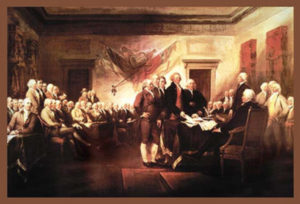
And there’s the famous John Trumbull painting of the ceremony in which the members of the Second Continental Congress signed the declaration on July 4th –> nope, that didn’t happen either. Most members signed the paper on August 2nd at the Pennsylvania State House. Some signed on other dates. The New York delegation was given permission to sign the document by their legislature on July 15th (since NY had abstained on July 2nd). Some signers hadn’t been elected to Congress yet in July.
But, OK, the document we have today (a copy is framed over my workbench) has 56 signatures and it’s dated July 4, 1776. Done and done. A result, at least, of some powerful storytelling.
Happy Fourth of July!

Today, July 4, 2017, we celebrate what has been called “The Great Experiment in Democracy on the North American Continent.” We’ve been working at this experiment for 241 years and it
has required a tremendous amount of sacrifice and quite a lot of very serious compromises,
some we can be proud of, some not so much.
The signers of the document, rich, white, male property owners (many slave owners) with much to lose, pledged to support the declaration with “our lives, our fortunes, and our sacred honor.” The late eloquent American journalist Paul Harvey (Presidential Medal of Freedom, 2009), tells the stories of what those signers had to do to support that pledge. Give it a look; much of it is true and all of it is moving.
https://www.youtube.com/watch?v=SRSHA7F3mIw
———————
So, how’re we doin’?
America had a population of 2.5 million in 1776 — today we number about 326 million — and each of us has a role to play. The challenge of representative democracy as it has come down to the latest generation of Americans has required an evolving recipe of leadership and followership. We expect our leaders to represent us well on national and international stages; we judge them every day on their ability to make us proud, keep us safe, and promote the values we claim to believe in. We, in turn, ask each other to support those values as we exercise what the Declaration of Independence enshrined as our “inalienable rights”: “Life, Liberty, and the Pursuit of Happiness.” Our common expectation, or hope, is that we will find ways to pursue those inalienable rights without stepping on the rights of others; AND we agree that our government will protect the ability of each of us to exercise those rights — or at least not stand in our way.
So, what do we do if we find ourselves disappointed with the outcome of those agreements
– disappointed with the “great experiment in Democracy” on this continent, in our town, in our neighborhood? And, let’s be frank, we often — often — find ourselves disappointed in our leaders, our fellow citizens, and at times, perhaps, even our own contributions to that agreement. What do we do? What should we do? What is expected of us when we expect more? Truth is, few of us will be required to give what the signers of the declaration had to give, as Paul Harvey described; some will, but relatively few. What is our responsibility when we decide that our leaders do not represent our values and ourselves the way we expect? Is it sufficient to carry signs in crowds that express our disapproval? I think most of us believe that more is expected. After all, we’ve got it pretty good, most of us. What’s the line in the book — “Of those to whom much is given, much is expected.” Does the legacy passed on to us by our, largely immigrant, forebears require some effort to carry on the values that were passed on to us?
The closer we look at our history — as we do when we watch the musical play “Hamilton” or “1776” on our theater stages — we find that the founders were, for the most part, fairly ordinary, imperfect people. Not granite statues. Sort of like the rest of us but, perhaps with greater ambition and maybe some particular talents that got them into positions of responsibility. Maybe they did something when they saw a need. Maybe their motives were good, maybe not. Many of us decide: “I think I can find ways to contribute, but they don’t seem sufficient.” For many, on both sides of a number of challenges that we face, we want something to change. I don’t have the wisdom or talent of those who have risen to positions of leadership over our lifetime; but I can recognize some of that wisdom when I see it. I recall many words of wisdom that have been passed down to me — all the way from “nothing to fear …” to “ask not …” to “ask why not,” but, for today, these come to mind: “we must be the change we seek.”
So, here we are. How do we “become the change …” ? I’m not sure any of us can make it happen by ourselves. In honor of “America’s anniversary festival,” we’ve got to figure it out together. Time’s a wastin’ …
For further reading: https://www.nytimes.com/2017/06/30/opinion/fourth-of-july-stephen-fry.html
![]()
And Yet, Optimists Speak

—————–
“In case you thought
optimism was dead,
the average pencil
is seven inches long
with just a half-inch eraser.”
— Robert Brault
—————–
—————–
—————–
—————–
Spoiler alert —–> Yes, it turns out that I am an optimist. Honest. Really. Maybe you are, too?
These days, such a label often elicits an insulting response, such as “How can you be an optimist? Aren’t you paying attention? Everything is going to hell in a handbasket. Just open the newspaper any day of the week.” Or “Anyone with experience knows better than to expect the future to be better than today.” Or “Right, an optimist, but I bet you look both ways before you cross the street, don’t you?”
My father was an optimist and I acquired that attribute from him. In fact, believe it or not, when he was an insurance agent back in the 1950s, he was actually the president of a club of other businessmen in town, called “The Optimists Club.” They had an “Optimist’s Creed,” which they recited at meetings. (Yes, they actually had meetings.) He was an optimist in earnest. As a successful businessman who had not completed the eighth grade and was the son of an illiterate immigrant, it was actually part of his experience to expect positive surprises.
The Optimist Creed was in a frame on the wall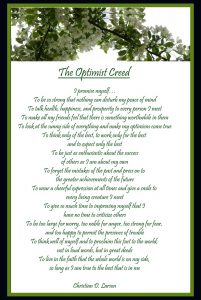
in my Dad’s office
<– <– <– — it looked like this
Why do I remember this? Back in the late
1950s, my Dad kept his office open until noon
on Saturdays; and sometimes he took me to
the office with him. I’d sit in the back of the
office and jam up the adding machine. (I think
I was supposed to be watching him in action
and developing an appreciation for the
insurance business. His plan was to hang a
sign outside that would say “And Son” and I
would one day take over the business.) But,
my actual accomplishment was to jam up the
adding machine. But I digress … why did I
bring this up? Oh yes …
A friend of his, Jerry Bassett, also a member of the Optimist Club, had a call-in talk show on the local radio station (KKIS in Pittsburg, CA). On those Saturday mornings, the show was playing on the radio in the office. One day, Jerry wasn’t getting enough callers; so, he called my Dad during a commercial and told him “I’m dying here, Al. Can you call me up with something interesting to talk about? Whuhduhyuhsay?” So, my Dad took the framed “Optimist Creed” off the wall and called him back.
I was stunned. There was my Dad, sitting at his desk, telling Jerry Bassett about the Optimist Club and why it meant so much to him. He actually read the Optimist Creed over the phone and I sat there and listened to my Dad on the radio — with the confusing five-second delay — talking about what it meant to him to be an optimist. Apparently, others called in and wanted to talk about it; so, I guess it sorta saved the show for Mr. Bassett.
For me, a ten-year-old sitting in my Dad’s office on a few Saturday mornings, while I didn’t acquire an interest in the insurance business, I did develop an appreciation for the idea of being an optimist — just by watching, listening, and observing how people responded to him.
I learned over time from my Dad and from my own observation, that being an optimist meant a number of different things to him and to others. As I read the news and listen to what people say about it all, I grant you that it requires some effort to be optimistic these days (I’m sure I don’t have to tell you that); but it seems that many of us have different views of what that might mean. So, let’s explore some of the different meanings people attribute to optimism — borrowing some words from a few others — and then, let’s try to figure out what it might mean to us to be an optimist today.
Let’s ask around. It seems there are different kinds of optimists.
The Delusional Optimist
This is a guy who falls out of the top floor of a ten-story building. As he passes the floors on his way down (the ninth, then the eighth, the seventh, etc), he says to people on those floors as he flies by on his way down: “I’m doin’ OK so far.”
This is the optimism that gets the most disdain from “realists” who are paying attention to the news (maybe you and me). This delusional optimist doesn’t get a lot of respect. He’s just wrong. In reaction to this rosy view of a harsh world, some pessimists call themselves realists and seek comfort by lowering their expectations:
The ‘Optimism’ of Lowered Expectations
“A pessimist? That’s a person who has been intimately acquainted with an optimist.”
— Elbert Hubbard
Some of us go to great lengths to avoid being called a fool. A pessimist makes clear that the world can be a bad place for real people; and asserts that a fool is someone who thinks it can be otherwise. Others, like Winnie-the-Pooh’s friend Eeyore, try to solve the problem by keeping their expectations low:
“It’s snowing still,” said Eeyore gloomily.
“So it is.”
“And freezing.”
“Is it?”
“Yes,” said Eeyore. “However,” he said, brightening up a little, “we haven’t had an earthquake lately.”
― A.A. Milne
The Patient Optimist: Two versions
“Everything will be okay in the end. If it is not okay; it is not the end.”
— John Lennon (I bet you thought somebody else said that first, didn’t you?)
This is the classic belief that, at some time in the future, something better will happen if you just wait for it.
Lin-Manuel Miranda portrays Aaron Burr as a different kind of patient optimist in ”Hamilton, the Musical.” Burr and Alexander Hamilton are both orphans who have an opportunity to impact history. Burr waits cautiously for the chance to fulfill his destiny in a very tough world and resents Hamilton’s more confident approach. He sings to the audience, “Wait For It” (click here to hear the entire song):
Life doesn’t discriminate between the sinners and the saints,
it takes and it takes and it takes
We rise and we keep living anyway, we rise and we fall and we break
We fall and we make our mistakes.
and if there’s a reason I’m still alive when so many have died,
then I’m willin’ to-
Wait for it …
Wait for it …
In the same show, Hamilton — expecting much more than waiting, says to Burr …
“If you don’t stand for something, Burr, what will you fall for?”
― Lin-Manual Miranda
Hamilton doesn’t respect those who are reluctant to risk making a commitment to something greater than themselves — a criticism he leveled at Aaron Burr, early in their fatal “rivalry.” Burr, wary of commitment, was held back by a feeling that ‘making a difference’ might be futile — or dangerous. In our own time, this very year, some of us fear that the prospects for a positive future are so bleak that there is no point in trying and the challenges we face are too big for us to make a difference. But there are optimists among us who remind us that it is too early to give up and we are pretty useless if we do:
The Resigned Optimist (aka the “No Other Choice” optimist)
“For myself I am an optimist. It does not seem to be much use to be anything else.” ― Winston S. Churchill
And then, some among us feel that we all have some responsibilities to those who will come after us:
The Burdened Optimist (aka “The Future has its eyes on you”)
“There is some good in this world, and it’s worth fighting for.”
― J.R.R. Tolkien
“The future belongs to those who give the next generation reason for hope.”
― Pierre Teilhard de Chardin
And then, some take that responsibility deeper, especially during difficult times (like war):
“Lest I keep my complacent ways, I must remember somewhere out there a person died for me today. As long as there must be war, I ask and I must answer ‘was I worth dying for?’ ” ― Eleanor Roosevelt
Ouch. Eleanor insists that we need to be worthy of the sacrifices others made for us. That brings us back to the need for a plan to make something better and the need to follow through with that plan. Optimism, of this variety, requires action since positive change doesn’t happen by itself. So, in order to avoid being called a fool, a person would have to make something better. You can’t just wait for it. So, this optimist must be bold and forceful, like this guy:
The Determined Optimist (aka “Just try and stop me”)
“My optimism wears heavy boots and is loud.” — Henry Rollins
The determined optimist has to make a show of it and get some attention. But then, that begs the question: ‘What are you actually going to DO to justify all of that stomping around? What are you going to accomplish?” What is worth the risk of being disappointed or being called a fool? From time to time, this brand of optimism can be sufficient, but not always. Some simply take a practical approach and compare optimism to a fruitless alternative:
The Confident Optimist (aka “Look, we know how to do this”)
“Pessimists are usually right and optimists are usually wrong but all the great changes have been accomplished by optimists.” ― Thomas L. Friedman
So, the need to accomplish something rears its (ugly/beautiful) head:
“One thing we know beyond all doubt: Nothing has ever been achieved by the person who says, “It can’t be done.” ― Eleanor Roosevelt, You Learn by Living
“BE the change you wish to see in the world.” ― Mahatma Ghandi
Like Eleanor and Mahatma, some notable optimists in our own time insist that despair is not helpful and we need to take responsibility to encourage others. You know this guy:
“The only thing that’s the end of the world is the end of the world.”
“Yes, we can.” ― Barack Obama
Not all of us are going to run for office, speak to an audience of millions, and change the world. For many of us it may have to be enough to serve as a good example to encourage others — our children, their children, people we meet — to BE the change that is required. Maybe all it takes is a few words of encouragement to younger minds — maybe words like “Yes, we can.” It turns out that some outcomes are possible even if we haven’t seen them before.
The “Who’s Going To Stop Me” Optimist (aka “What do you mean it can’t be done?”)
“Sometimes you have to pass through the fire swamp to get where you need to go.”
“But, we’ll never survive.”
“Nonsense. You’re just saying that because no one ever has.”
— William Goldman, The Princess Bride
Is it often difficult to distinguish the “Delusional Optimist” (you remember, the guy falling out of the building) from the “Who’s Going to Stop Me” optimist, but the difference matters. Many optimists are occasionally intimidated by the enormity of great challenges — finding that important things seem to require great effort, by a great many people. But some wise people suggest the opposite approach: taking small steps in the company of just a few people:
The “Incremental” Optimist
“The secret of getting ahead is getting started. The secret of getting started is breaking your complex overwhelming tasks into small manageable tasks, and starting on the first one.” — Mark Twain
“A year from now you will wish you had started today.” -Karen Lamb
“A small group of thoughtful people could change the world. Indeed, it’s the only thing that ever has.” – Margaret Mead
“Thou hast seen nothing yet.” — Don Quixote de la Mancha (Cervantes)
It turns out that some outcomes are possible even if we haven’t seen them before. Some look at the mixed advice we hear and get discouraged by disappointing outcomes — but some don’t.
The “Maybe this time” Optimist
One thing seems essential — that we do not settle into the extremes of “always” and “never” — that we find an optimism based on the idea that, sometimes, good outcomes are possible. Sometimes. This poem by Sheenagh Pugh reminds me that, whichever variety of optimist I decide to be, on a particular day, there is reason to believe in positive outcomes. They don’t happen by themselves, they do require our efforts, but they happen … sometimes.
And that may be enough. I may be this kind of optimist …
Sometimes
Sometimes things don’t go, after all,
from bad to worse. Some years, muscadel
faces down frost; green thrives; the crops don’t fail;
sometimes a man aims high, and all goes well.
A people sometimes will step back from war;
elect an honest man; decide they care
enough that they can’t leave some stranger poor.
Some men become what they were born for.
Sometimes our best efforts do not go
amiss; sometimes we do as we meant to.
The sun will sometimes melt a field of sorrow
that seemed hard frozen: may it happen for you.
— by Sheenagh Pugh
Sorting Out the Voices
So, what have I learned from all of these voices? My Dad taught me about “sometimes” as his Dad taught him. The other side of “sometimes” is that sometimes we need to stomp around and be “The Determined Optimist,” and march in the street with other determined optimists. Sometimes the best we can be is “The Resigned Optimist” and simply try not to give up. Sometimes we are forced to be “The Patient Optimist and “Wait for It.” Sometimes we can see a middle path and serve as a “Confident Optimist” and contribute to incremental change by contributing to organizations that can accomplish important changes with lots of small donations (examples: organizations like the ACLU, Planned Parenthood, PBS, The Yosemite Conservancy, Meals On Wheels, your local library … you probably have your own list.) Those among us with more imagination and determination may find ways to “Be the change we seek.” Perhaps our task, if we can’t BE one of them, is to support those who do.
![]()
Click here to download a PDF of this article: Optimist_ConVivio_April14
A Guy Walks Into a Bar
Sandburg—  “You teach yourselves the law
“You teach yourselves the law
but I train your minds.
You come in here with a head full of mush,
and you leave thinking like a lawyer.
But … it may not be enough.”
— Professor Charles W. Kingsfield
from “The Paper Chase”
(a movie set at Harvard Law School in 1973)
Sandburg
+++++++
+++++++
Walking down Massachusetts Avenue, on his way back to his fraternity, a first-year law student found himself in the middle of an unexpected downpour without an umbrella. As luck would have it, he was passing a popular watering hole frequented by Harvard Law students and professors. From habit, he mentally acknowledged the weird fact that The Grafton Street Pub & Grille was actually on Massachusetts Avenue; but it was forgiven for its convenient location right beside Harvard Square. Gratefully, he ducked into the dark, leather-appointed bar, since he was clearly unprepared for the inclement conditions outside. He calculated that the storm was likely to continue for just as long as it would take to sit down at the bar with a class of “Maker’s Mark,” and he could be on his way once conditions had improved. Not a bad way to pass the middle of an otherwise worthless afternoon.
Apparently, others had the same idea — the place was packed. In fact, there was just one empty barstool, at the end of the bar next to an older well-dressed gentleman — probably a professor, he reasoned. So, he took his place, and signaled to the barkeep: “Makers’ Mark neat, please.”
As the drink arrived with a bowl of nuts, the gentleman to his left cast a sidelong glance at him without turning his head, “I see you were unprepared for the forecast.”
“Well, I didn’t think …”
“So I surmised,” he said without letting him finish.
“Well, sure, uh, cheers … sir.” He figured he might as well pass the time with some idle conversation. The guy seemed rude but harmless. Start with flattery. “I haven’t seen you in here before. Are you a visiting professor?”
“Visiting? I suppose one could say that. I’ve been away a very long time.”
“My name is Hart. Kevin Hart.” He extended his hand, a courtesy that was not returned. Maybe he didn’t notice, he thought. “Where have you been so long?”
“Well, young man … “ and he finally turned to look at him directly. “I don’t suppose you’ve read any Dante.”
“The Inferno?”
“Il Purgatorio. On my way up and out, hopefully, but it seems I need to pass through here first. Unfinished business, perhaps.”
Kevin didn’t quite know what to make of this. He decided to humor him. No need to be rude; and who knows, he may find himself in this fellow’s classroom one day. “What do you teach?”
“Contracts. Or so I did at one time. Clearly with less success than I had hoped.”
“I had Professor Warren for Contracts. Pretty straightforward, I thought. You say, ’With less success’ than you had hoped … Why do say that?”
“Leaving the impression of ‘pretty straightforward’ doesn’t speak well for a course of that complexity; but I have to say that the evidence suggests that I didn’t do much better. As far as I can see, the notion of ‘Contracts’ hasn’t been well-assimilated in this society. I suppose Harvard Law, AND I, have some responsibility for that failure.”
“Well, [defensively] it seems that Harvard Law has made some significant contributions, wouldn’t you say? I mean, a number of Presidents have come from here. That would seem to suggest at least some success. Obama came from here, as did both Roosevelts and Kennedy … ”
“And both Adams’,” [he makes a face], George W. Bush [sighs loudly and takes a deep drink of his whiskey], Rutherford B. Hayes [his eyes roll] … but I’m quite sure that isn’t the ideal figure-of-merit for an institution that purports to make a difference in society. There are elements of the law — especially contract law — that seem to have fallen into disrepair of late. Not sure Harvard Law, or any educational institution up and down the spectrum, can be proud of that.”
“Well, I feel the need to speak up for my school, I think I am receiving a quality education, yes, in Contracts, and other areas.
“Go ahead. [For just the second time, he turns to look at Kevin directly.] Defend your school. Tell me about Contracts.”
Now he’s on the spot … it feels like an oral exam. He waves to the bartender and points at the two empty glasses on the bar to order another round. He begins. “Written contracts are perhaps the most forceful self-managing tools in our society. We have well-established norms that are clearly enforceable and fairly efficiently litigated. Binding contracts between known entities, signed and witnessed, are … “ [He’s interrupted.]
“Let me ask you, Mister, uh …” [gestures his question as the second round of whiskeys arrives]
“Hart. Kevin Hart.” [Deflated a bit, he was just getting started.]
“Mister Hart. As you teach yourself the law, as ‘straightforward’ as you say it is, perhaps there are questions worth exploring that you, and others of recent generations, may have overlooked. Examples: Are contracts binding only on those present for, as you say, the ‘signing and witnessing?’ Must the specifics of societal agreements be written on a piece of paper? Are there responsibilities by which one generation, for example, should be held accountable to another generation? Are there values, principles, and expectations that should provide continuity and social identity in a society over time?”
In a familiar professorial speech pattern, he doesn’t wait for an answer. “I argue that there are standards of acceptable logic and quality thinking that have historically been accepted, and expected, that have all but disappeared from public and private discourse. Standards for the assumption of truth and accuracy were practiced in my day without the necessity of challenge. I assert that Americans have a collective responsibility to understand how our institutions work and to pass that understanding on to generations that follow us.”
Kevin recognizes the pedantic behavior. “My grandfather told me about a professor who said something like that to him — something about teaching himself the law — he was a tough old bird. He used to ask questions that sounded simple but tangled grandpa in knots. Said the guy made him lose his breakfast one morning.”
Kevin took advantage of a pause while both of them sipped from their glasses. He tried consciously to extricate himself from the feeling of sitting in a lecture hall and the urgent need to be taking notes; but to no avail …
“So, young man, to answer the question that is likely to be on your partially trained mind, I do feel some responsibility, shared though it is with the rest of American education and upbringing, for the fact that the quality of American decision-making has demonstrably diminished in recent years, wouldn’t you say? You pointed out that Harvard Law provided a list of American presidents, albeit of mixed quality, along with other prominent decision-makers and thought-leaders; but I assert that Harvard Law is now contributing more professionals to Wall Street that to the halls of government [rolls his eyes again.], which is not exactly a feather in its cap. I also assert that the current abominable level of intellectual application that has created your current societal disorder is the product of abysmal application of educational principles. The Socratic method of instruction, which I grew up with and which I employed during my career, is useless on an audience without the prerequisite skill in logic, knowledge of factual precedent, means and ends, and the ability to recognize and apply common sense. The absence of those attributes, among both educators and members of society writ large has led to some dismal decision-making. I read your newspaper this morning and could not believe what I was reading. It sounded like a poorly written comic novel.”
Kevin was feeling the need to say something to avoid assenting to the lecturing nature of this conversation; so, “I agree that my country has made some terrible decisions at all levels, in the halls of government, in the voting booth, as well as on the street — heck, I came out today without an umbrella, that’s what brought me in here. But I am in law school to prepare myself to do something useful — to be part of a solution. So, professor, what is your plan to mitigate all of that? You suggest that you have some responsibility to admit and some damage to repair. So, what’s your plan? Have you come back to Harvard simply to admire the problem and confess your culpability, or do you offer a solution?”
For a third time, the professor turns to address the student directly. “I have two answers. First is to attack the crisis in Civics Education. The problem is not just my complaint about Harvard Law School, the deficiency exists at all levels of education. Among the American population, knowledge of the three branches of government, how they work, why they matter, how they balance and check each other is at the lowest point in our history. Even those appointed to the highest levels of government service seem to have a dangerously unrealistic understanding of the scope of a president’s power. Equally lacking is our understanding of the importance of the news media as the backstop to protect against egregious mistakes. A public figure while I was still at Harvard Law, Daniel Patrick Moynihan, famously taught us: “Everyone is entitled to their own opinions but they are not entitled to their own facts.” America has made serious mistakes in our history, but our strength has always been in learning from them and trying not to repeat them. Right now, I warn you, because of the ignorance of our institutions coupled with an inability to recognize facts, there are serious mistakes that you will have to make, and learn from, all over again. Some of those mistakes are beginning to happen right now. Education is the only way to avoid doing that and it’s not going to be a quick fix.
“My second solution is you.” He pauses for effect, keeping his eyes on the student while he drains the last of his whiskey. “I think the best thing I can do is to turn this responsibility over to you. I’ve given you enough to proceed on your own. You have said that you plan to graduate and fulfill some dream of making a difference. We’ve identified some fields you can plow in that effort. Perhaps the challenge can be met in the field of education or rhetoric, or maybe you will be the eighth president to come from this institution. That rests squarely on your shoulders. So, now that I’ve assigned the problem to a qualified student, I think I’ve spent enough time here.” He gestures grandly at the inside of the Grafton Street Pub. “I claim that I have fulfilled the requirements of Dante’s ‘Purgatorio.’ I’m going to call it done. Let’s agree that it’s your responsibility now. Thank you for the drink and try to stay out of the rain. I wish you well Mister . . . what was it?”
“Hart. Kevin Hart. And you, professor? I didn’t catch your name.”
“Kingsfield. Charles Kingsfield.”
Click here to download a PDF of this post: Guy_walks_into_a_Bar_Mar10_2017![]()
For those interested in the need for an improvement in Civics Education in America,
a national initiative with that goal has come out of the Second Circuit of the Federal Court system.
It’s called “Justice for All.”
Take a look here: http://justiceforall.ca2.uscourts.gov/
And It’s Still Just February
Sandburg— 
Sandburg
Sandburg
“Five hundred twenty-five thousand
six hundred minutes.
How do you measure a year
in a life?”
— from “Rent”
Sandburg
+++++++
+++++++
Some Years Stand Out
I recently wrote a piece asking “What kind of year was 2016?” Some of you participated by contributing to ConVivio’s “Thirty-Word Challenge” and sent me your assessments of how 2016 will lead to 2017. You sent me some great words. (Take a look: https://convivio-online.net/looking-back-at-2016-ahead-to-2017.) Maybe though, the bigger question is … what difference does a single year make? Is 2017 going to be just a detour or will it be a major turning point?
Over the course of my 66+ trips around the sun, some years stand out in memory — some were good, some bad, and some were turning points in the flow of history. During the first half of the 2017 Super Bowl (while the Falcons were still blowing out the Patriots), I was sitting with an enlightened friend of mine (I’ll call him Judge Danny) and somehow we got to talking about years. At halftime, the TV commentators were talking about other Super Bowl blowouts, like the 49er destruction of the Broncos (55-10) in 1990.
PapaDan: 1989 was a memorable year, too. The 49ers beat the Bengals…
Judge Danny: Then there was the 1989 World Series with the Giants and A’s…
PapaDan: I don’t want to talk about it. [Changing the subject] That was also the year the Berlin Wall came down, and revolutions popped up all over Eastern Europe.
Judge Danny: Right…the end of the Cold War.
From sports we segued to “most momentous years.”
PapaDan: 1969 — Armstrong walked on the moon…
Judge Danny: And returned home. 1963 was unforgettable. It hurt bad. I was thirteen.
PapaDan: Yes, it hurt. 1964 was better, the Beatles and lots of great music. And 1951 was a huge year in baseball. Growing up, I read all about Bobby Thompson’s “shot heard ‘round the world.” Russ Hodges went crazy: “THE GIANTS WIN THE PENNANT! THE GIANTS WIN THE PENNANT!” 1962 was another good year for the Giants, less dramatic but a big thrill.
Judge Danny: I remember; but those were just baseball, right?
PapaDan: Right. So, in our lifetime, what do you figure was the most important year of all?
Judge Danny: We’re the same age, right? We both graduated in 1968. That was the biggest year since we’ve been around. Don’t you think?
PapaDan: Wow. Yes. No question about it. 1968 was a turning point.
We were interrupted by the second half kickoff and the subject of the “most important year” didn’t come up again — we were too busy bemoaning the collapse of the Atlanta Falcons. The next morning, though, after depressing myself with the newspaper, I decided that Judge Danny had been right — 1968 was the single biggest turning point during my lifetime, both for me and for America. There was a lot going on during several years of the turbulent sixties. But 1968 stands out. The title of an important research project on the subject said it well:
“The 1968 Project — A Nation Coming of Age.”
What did we see on the Evening News in 1968?
It was a year of “just one damn thing after another.” President Lyndon Johnson began the year with his State of the Union Address noting that “Our country is challenged at home and abroad,” and the challenges began immediately. One week later, North Korean patrol boats captured the Navy intelligence ship “Pueblo” within their 12-mile territorial waters, initiating a dangerous year-long international crisis. Then, a week later, the Vietcong launched the brutal “Tet” offensive; massive numbers of troops poured out of the jungles and devastated dozens of cities and towns. The surprise invasion of the U.S. Embassy in Saigon and sudden large-scale deaths of American soldiers quickly turned public opinion against the war. Two days later, Richard Nixon declared his candidacy for president. The following week, the Pentagon announced the largest one-week casualty figures of the war and Walter Cronkite, having just returned from a tour of the battlefields, reported that the best America could expect in the war was “a stalemate.” In the White House, President Johnson said privately, “If I’ve lost Cronkite, I’ve lost Middle America.”
–> All that, and it was still just February.
As the year unfolded, the news continued to surprise and distress a lot of people.
— March 12: Senator Gene McCarthy nearly defeated the sitting president of his own party in the New Hampshire primary. Four days later, Senator Robert Kennedy withdrew his support of President Johnson and announced his candidacy.
— On March 31: President Johnson, overwhelmed by anti-war pressure, announced, “I shall not seek, and I will not accept, the nomination of my party for another term as your President.”
— April 4: one week after leading a march in Memphis that turned violent, Dr. Martin Luther King, Jr., was shot and killed while planning his “Poor People’s March on Washington,” sparking riots across the country. Robert Kennedy, hearing of the murder just before giving a speech in Indianapolis, stood up at a street corner and gave an emotional extemporaneous eulogy — pleading with the mostly black audience “to tame the savageness of man and make gentle the life of the world.”
— On April 29, the musical “Hair” opened on Broadway, dramatizing powerful social and political change and a “generation gap” between those who were coming of age in 1968 and their parents’ generation.
— May 6: In Paris, 5,000 students marched in what was soon called “Bloody Monday,” the most violent day of a student revolt. Sympathetic strikes involved nine million French workers.
— June 5: Robert Kennedy won the California Presidential Primary, a victory that all but assured him the party’s nomination. Minutes after his victory speech, he was assassinated.
— July 24: at the Newport Folk Festival, singer Arlo Guthrie performs his 20-minute ballad “Alice’s Restaurant” to rave reviews. (“You can get anything you want, at Alice’s Restaurant.”)
— August 8: The Republicans nominated Richard Nixon to be their presidential candidate.
— August 20: The Soviet Union invaded Czechoslovakia with 200,000 troops.
— August 26: The Democrats nominated Hubert Humphrey for president. Outside the convention, protests erupted and Chicago police arrested nearly 200 people and sent more than 100 others to hospitals with “night-stick” head injuries.
— September 7: “Women’s liberation” groups protested at the Miss America contest in Atlantic City. While nothing actually burned, the phrase “symbolic bra-burning” was coined.
— October 12: The Summer Olympics opened in Mexico City, boycotted by 32 nations to protest South Africa’s participation. Two U.S. medal winners in the 200-meter dash, gave the “Black Power” salute during playing of the Star-Spangled Banner at the medal ceremony.
— November 5: On Election Day, 31,770,000 (43%) voted for Nixon. 31,270,000 (42.7%) voted for Humphrey. 9,906,000 (13.5%) voted for George Wallace.
— November 14: On “Turn In Your Draft Card Day,” young men across the country burned their draft cards and protested the Vietnam War.
— December 12: Robert and Ethel Kennedy’s eleventh child, Rory, is born.
What was it like for those of us watching all of this?
For me and others born in dead-center in the 20th century, 1968 was a singular turning point. We were “The Class of ’68” at Antioch High School. Except for the stories Walter Cronkite told us on The Evening News, the future looked bright. Like most of my high-school friends, I lived in a bubble of stability and certainty. High school was good for me — I got good grades, I played varsity sports, and in May I was accepted to the college of my choice (Santa Clara University). I had a supportive family who encouraged me every step of the way, and I was surrounded by friends who were a lot like me. But 1968 was also the year I got my first look at discrimination, major disappointment, and local cruelty.
Racial Discrimination
I started kindergarten in Antioch in 1955 and it took me until I started high school to notice that there had never been ANY black students in my school or anywhere in my town. The first black kids I met were on the basketball court when Antioch High played Pittsburg High.
That year, Antioch’s foreign exchange student was a girl from South Africa. Apartheid was still in full force there and I remember hearing her speak proudly about “separate but equal.” It didn’t sound right to me.
Then came “the big story.” The parents of a student two years behind me (class of ’70) had moved to Antioch at the beginning of the school year. As new arrivals, they were visited by the city’s “Welcome Wagon” and given a basket with various household products, advertisements for local stores, and advice about the town. The “Welcome Wagon” greeter assured this new family that “This is a nice town full of nice people. And don’t worry, you won’t find any blacks here — the realtors and landlords in town make sure of that.” The new neighbors didn’t like that at all. They asked around and found that others had heard the same thing. Long story short, they filed a class-action lawsuit that gave Antioch an apparently well-deserved reputation for racism. I was stunned — discrimination in MY town!
Optimism, Disappointment, Cruelty, and Regret
Before midnight on June 5, 1968, I went to bed happy. I had turned off the TV following Robert Kennedy’s victory speech after winning the California Primary. “Let’s go on to Chicago and win there,” he concluded. It was one of the last three “school nights” before my graduation on Friday. I was a huge fan of the Senator — my father passed on to me that we were “Roosevelt/Kennedy Democrats.” I wanted very much for RFK to become president and pick up where his brother had left off. I figured Bobbie would end the war (and, therefore, the draft), support the civil rights legacy of Dr. King, and … well … save us from Richard Nixon. In the morning, I was still in bed when I heard my mother come back from retrieving the newspaper and heard her shout, “Turn on the television!” I jumped out of bed and turned on the TV to hear that Robert Kennedy had been shot right after delivering that victory speech. I stared at the TV and cried. I was 18 years old and I cried, hard.
Numb, I went to school. Some kids were stunned, a few were visibly upset, others hadn’t yet heard the news. It was the talk of the hallways by noon. After lunch, I walked into my Journalism class and found one student crying uncontrollably at her desk. She was known to be an extremely sensitive girl and prone to emotional displays. A few kids made it their business to try to protect her from bullies who made fun of her. Before the teacher arrived and before I realized what was happening, a jerk named Michael, one of those bullies who sensed weakness and attacked for the fun of it, went up to her and announced, “Those Kennedys got what they deserved. I say it’s about time. There’s just one left, and we’ll see about him.” She knocked over her desk as she ran sobbing from the room. Michael strutted as he followed her out the door. I quietly righted her desk and walked away as other students began to arrive.
This incident compounded the darkness I was feeling — darkness that got a lot worse before it got better. It took me some time, perhaps mid-summer, before the regret set in. I had never actually punched anyone in my 18 years (or since); and if I had punched Michael, nothing would have gotten better. But I have to say that the single greatest regret that endures all of these decades since my high-school days is that I didn’t do or say ANYTHING. I was the witness to something harmful done to a vulnerable person … and I didn’t do anything.
Moving into a New World
Graduation was fun. It made me feel that the future was bright. But as summer warmed up, I became aware that the “bubble of stability and certainty” that I had lived in was disappearing. I was moving out of a comfortable home and leaving behind a school and a town where I had known sort-of everybody. I realized that I would be surrounded by strangers. So, come September, I had moved into the dorm (with the help of my sister), and life began anew. Shortly after that, my roommate looked at me one day and declared, “A guy’s got to have some hair” and before I knew it, I had grown a mustache that I would have for the next forty years.
College was great! There was terrific music everywhere (that most of our parents hated). Judy Collins performed a concert in my cafeteria my first month at school. Later that year, I spent a weekend with my oldest home-town friend in his dorm at the University of San Francisco; and we saw a free concert with The Jefferson Airplane in the Golden Gate Park Panhandle, (We even got “busted” by the dorm prefect … for drinking beer. Yep, beer.)
Down the hall in my dorm, was Dan Pastorini, our quarterback (a future NFL star) and the cheerleaders were all guys. (Huh?!) Professor Misselbrook inspired me with Robert Frost and Shakespeare, Dr. Bellotti taught my first (and last) Economics class (I had applied as an Econ major), and Dr. Nyquist, the Music Department chairman, stimulated a lifelong interest in Baroque music (who wouldda thunk?). But still, who was I? Where was I going? Would I end up taking over my Dad’s business (the plan) or become a teacher, writer, or something else? How soon would I begin to feel at home … again? As the year ended, the newspaper continued its drumbeat of scary stories — 549,000 troops in Vietnam and a death toll of 17,000, the highest in the war’s history. The day I drove home for Christmas, the “Pueblo,” was finally released. I admit I didn’t notice either story. Suddenly, all of the worldwide uncertainty that I had heard on The Evening News all year, didn’t seem as important as the turning point I was experiencing as an 18-year-old college freshman on my own. I had much to learn about myself and the world around me.
Back to “the future”: 2017
So, fast-forward nearly 50 years. Here we are in 2017, trying to make sense of a year that seems to change every day. In just a month, the leader of the free world:
— Spread a series of “alternative facts” that advisors repeated and the world knew to be false,
— Initiated a potential constitutional crisis and caused chaos world-wide at airports, cities, and universities with an executive order to ban immigrants from seven countries, an order that he said had been implemented “smoothly” until it was blocked by a “so-called judge,”
— Sent a young “senior advisor” out to threaten judicial authority on the Sunday talk shows and clarify that “the powers of the president to protect our country … will not be questioned,”
— Told the Mexican president that he might send troops into his country to “take care of” some of his “bad hombres”; that same day he hung up on the leader of Australia,
— Insulted a long-term African-American congressman and civil-rights icon on the Martin Luther King holiday, calling him “all talk, talk, talk” and calling his hometown of Atlanta a “crime-ridden hellhole,”
— Promoted a political strategist (former Breitbart executive) to the National Security Council, and demoted the Director of National Intelligence and Chairman of the Joint Chiefs of Staff,
— Installed a national security advisor who had an inappropriate/illegal, back-channel relationship with America’s most dangerous adversary, then fired him for it, and blamed his firing on the news media for spreading fake news (“the information was real but the news was fake” and “I didn’t direct him to do it but I would have if I thought he wasn’t doing it.”),
— Responded to accusations of mental instability by saying “I comprehend very well, OK, better, I think, than almost anybody,” and observed that, in his chaotic first month in office, his administration was a “smooth-running machine.”
Commentators, writers, readers, listeners, citizens, others (you know, you and me) are asking questions like these: What’s true and what’s not? How do we know? Who is “we” and who is “they?” Do the things we’ve learned over a lifetime still apply to the present moment? To the future? And most important, what can we do to make sure this year is only a detour and not a turning point?
–> And it’s still just February.
Click here to download a PDF of this post: ConVivio_Just_February_Feb19_2017
— Major thanks to Gretta for good advice and to Lauren for her expert editing —![]()
How Lucky We Are …
 Carl Sandburg—
Carl Sandburg—
Orville Wright1
“Look around, look around,
look how lucky we are
to be alive right now.”
— Eliza Schuyler (from Lin Miranda’s “Hamilton”)
Carl Sandburg
… to be alive right now
These days, like so many others, I am immersed in “Alexander Hamilton.” The musical play has been all the rage — a roaring success on Broadway and now it’s coming to San Francisco! So, in our house, we have been listening to the brilliant hip-hop soundtrack; reading Ron Chernow’s biography of Hamilton (which inspired the musical); reading Lin Miranda’s script and commentary about the creation of the show; AND, yes, we have tickets to the show in May.
When I first heard about the show, I admit to being skeptical — a Broadway musical about the first U.S. Secretary of the Treasury (“the ten-dollar founding father”) set to “hip-hop” music (What is ‘Hip-Hop’? I asked). But once I heard the soundtrack and felt the spirit, I have become a convert. The music and lyrics combined with our founding story and spirited characters are nothing short of thrilling. At its core, “Hamilton” is a classic story of a poor immigrant who showed up at a critical time and made a powerful contribution to American history. In a useful lesson for today’s leaders, he did it by acknowledging his ignorance and educating himself. It is also a story devoid of a ‘Disneyland’ ending (spoiler alert: the hero, the former Secretary of the Treasury, gets killed in a duel by the sitting Vice President of the United States, Aaron Burr, at the dueling ground in Weehawken, New Jersey in 1804, no foolin’).
Twenty-eight years before their duel, as they prepared to join forces in the revolution, Burr gave Hamilton some advice:
“Talk less. Smile more.
Don’t let them know what you’re against
or what you’re for.”
And then, more to the point, in a much faster rhythm:
“I’m with you, but the situation is fraught.
You’ve got to be carefully taught.
If you talk, you’re gonna get shot!”
In the summer of 1776, Hamilton and Burr met in New York as the revolution was in full swing. It was an exciting time. Eliza, one of two Schuyler sisters destined to fall in love with Hamilton (yes, it’s a love story), sums it up:
“Look around, look around
at how lucky we are to be live right now.
in the greatest city in the world!”
How lucky? The excitement and optimism of the time was swirling all around them:
• talk of freedom and independence was everywhere on the streets of their city,
• revolutionary ideas (including the publication of Thomas Paine’s “Common Sense” in January of 1776) were on everybody’s lips (both for and against), and
• it was a time when young people could step forward and make a difference.
It also had a very dark side.
• War was brewing against an empire with the most powerful army and navy in the history of the world, and winter was approaching.
• Slaves were being bought and sold on the streets and wharves of their own city. Slavery had turned out to be the necessary political compromise among the colonies that made the union possible; so, abolitionists like Burr, Hamilton, and their New England compatriots had to swallow hard to believe that they could bend the future to match their principles, but … later.
• New York harbor would soon be flooded with 260 British Navy warships and thirty-two thousand British soldiers. Thousands of their neighbors would be killed in battles fought in their own towns and farmlands. Many would starve during the harsh winter that arrived with the well-fed British army and navy.
So, while these American patriots were optimists, their optimism came at great cost. The King was determined to show no mercy to his disloyal subjects and reclaim his valuable property on the American continent. In the show, the comically mad King George character sings,
“You’ll be back, soon you’ll see,
Yes, you know that you belong to me.
And when push comes to shove,
I’ll send an armed battalion to remind you of my love.”
These revolutionaries knew that many of them would personally suffer the ultimate cost for securing a future for their descendants. And they did.
To be alive right now
How lucky? Fast forward to now — here in 2017. What about us, you and me: the 21st-century descendants of those wild-eyed optimists? What can we learn from reflecting on their experience and ours? Have we preserved their vision of America? Is our vision of the future as bright as theirs? Are our challenges greater? Do we have reason to be hopeful, right now?
• Today, as 2017 dawns, many of our friends, neighbors, and ourselves are doing pretty well. Most statistics say that, overall, our economy is doing OK; the stock market is soaring. Isn’t it?
• Technology and other 21st-century advancements are improving our lives in exciting ways and many aspects of American life give us reason to believe that the future is bright. Right?
• After eight years of an African American President, shouldn’t race relations be encouraging?
• America has the unique distinction of being the world’s dominant superpower. Shouldn’t the founding fathers, and we, be proud and satisfied with the outcome of our revolution?
We are the heirs of the ideals, the optimism, and the governing principles that those brave folks earned for us, right?
–> So, today, can we repeat what Eliza sings early in Act One of “Hamilton?”
“Look around, look around
at how lucky we are to be alive right now.”
Well, sure. That was in Act One. But, before we romanticize the optimism of the revolution, let’s not forget that Thomas Paine had to publish his famous pamphlet encouraging American independence anonymously (see Aaron Burr’s advice to Hamilton, above). The threat was real.
How lucky? Today, as we read the hard, frightening, depressing news of today and listen to each other talk about it, there are growing fears lurking in our future:
• The news media, long the principal vehicle for ensuring an informed electorate, is threatened with access limitations and credibility challenges,
• Long-held American foreign-policy positions and international alliances are now in doubt, apparently without the careful study and decision-making processes we have come to expect,
• The conclusions of science, long held to be the bedrock of our understanding and the foundation of our policy decisions, are being devalued by those taking the reins of power,
• Progress in securing the safety net for retirement income and health care is threatened,
• Human rights, regarding race, gender, and national origin are being weakened by those who seem to have forgotten our long struggle to eliminate discrimination and inequality of all kinds,
• The long-held bipartisan goal of reducing the nuclear danger is now threatened by new leadership that speaks of pursuing a new arms race,
• The goal of government, to support the well-being of all Americans, is now called into question by those who are lining up to run our government for the benefit of the few.
Optimism, Hope in 2017?
In my own fear of what lies ahead, I am reminded to be confident, but patient – in words that Dr. Martin Luther King, Jr. borrowed from a sermon delivered in 1853 by an abolitionist named Theodore Parker, who borrowed it from others before him:
“The arc of the moral universe is long,
but it bends toward justice.”
But patience, while necessary, is not sufficient. Success — as illustrated by Hamilton, Parker, King, and others — is reserved for those who work actively to bend that arc. Those words were used, not at the end of successful struggles but at the beginning of hard times, when success seemed unlikely. Even when we think we’ve made progress, we do not always complete that progress without the inevitable detours. If I try to replicate the optimism of the American revolution, in the face of likely defeat; or try to emulate the hope of abolitionists, in the face bitter compromise; or support the efforts of those pursuing justice, in the face of bigotry; I conclude that 2016 must be considered a detour. It doesn’t have to be a reversal of our progress or an abandonment of the path we thought we were pursuing. We can make it into a detour – but we need to find our way back to that path. The administration of Donald J. Trump is not the end of this story nor the name of a new path to the future; it must be identified as the name of a detour.
OK, I apologize. I thought I could avoid using his name, but I decided that we must name the challenge if we are going to defeat it. We must not speak of Trump like Voldemort (“He-who-must-not-be-named” or “The Dark Lord”) in Harry Potter. The ideas he represents must be faced head-on, opposed, and defeated before we get too far off the path we were on and lose our way. So, as we approach the 2017 inaugural address, let us recall the words of the first inaugural address I watched, from a time in my youth, characterized by more optimism and confidence (and patience) than we might be feeling today:
“All this will not be finished in the first one hundred days.
Nor will it be finished in the first one thousand days . . .
nor even perhaps in our lifetime on this planet.
But let us begin.”
— John F. Kennedy, January 20, 1961
So, now the real work begins.
Along with that work comes some frustration. Those of a certain age remember marching on college campuses and engaging in political action to bring important American values into the light of day — values, among others, like these: equal justice and opportunity under the law, women’s health and reproductive rights, racial integration and civil rights, and decisions about America’s use of military force and the draft. Those battles were successful, in their day. The disappointment, and the reality, is that they must be fought all over again.
So, today — what will it take?
Remember: we know how to do this.
• Some will welcome those who are not welcome, in their own communities.
• Some will contribute time and dollars to help those who will suffer during this detour.
• Some will join movements to influence votes.
• Some will march, when the need arises.
• Those with influence — teachers, lawyers, bartenders, parents, grandparents, neighborhood leaders (you know, you and me) — may find a way to encourage compassion, common sense, and unity in small places among those who will take over when we are gone.
We know how to do this. Let’s start. (The forces on the other side have already started.)
“The only thing necessary for the triumph of evil is for good men to do nothing.”
— Edmund Burke (and others) ![]()
Click here to download a PDF of this article: ConVivio_How_Lucky_to_be_alive_right_now
Thanks to Lauren De Vore for her Editorial advice.
Looking Back at 2016 — Ahead to 2017

“How wonderful it is
that nobody need wait a single moment
before starting to improve the world.”
— Anne Frank
“The nation which can prefer disgrace
to danger is prepared for a master
and deserves one.”
— Alexander Hamilton
“Yes, we can.
— Barack Obama
2016/2017
Carl Sandburg
What Are Your Feelings About 2016 and Your Outlook for 2017?
(Your responses to the writing challenge: 30 words or less)
Of the fifty-some people who read ConVivio’s “2016” post, ten of you responded to its
30-word writing challenge. I admire the variety of approaches you took: some with a broad national perspective; others with observations focused on their own lives; some optimistic, others not so much; some were quite poetic.
Thanks to everyone who sent a response. Here they are:
==========================================
Overcome the recentness bias this year? I think not.
The election’s outcome could affect us for decades.
Color me cynical and sad for this fine country.
— Katie Walter, Stockton, CA
2016: The rotting corpse of the Democratic Party hopefully saw the error
of moving to the right.
2017: As Daniel said on the series finale of Rectify, “I’m cautiously optimistic.”
— Steve Rubio, Berkeley, CA (typepad.com)
I’m ready to fight against climate change and Trump’s agenda.
— Sonia Faletti, Washington D.C.
Working on myself as an active participant — How can I be more present?
How can I be more aware? How can I be a consistent critical thinker engaging with others?
— Matthew D. Sapone, Aptos CA
Incredible year, many “ups,” one YUGE “down.”
Ups: Changed from large stable company to a startup. Excellent decision!
Loving husband, strong family life, great friendships.
Downer: Won’t say his name.
— Nouanepheng Sapone, Aptos, CA
If you want someone to understand (and adopt) your viewpoint,
you must first listen to and understand theirs.
No more preaching to the choir.
— Lauren de Vore, Livermore, CA
The elections were like a pollution cloud, darkening everything.
Now, every day brings new confirmations of how bad 2017 can be,
for our country and the world. We’re worried.
— Megan Taylor, Bellingham, WA
Unexpected atheism explodes into confidence as the rush of information
restores limbic, and age of majority is reached. Zen heart at 80 beats per
minute while ruffian’s words exile paralysis.
— Jody Tims, Morgan Hill, CA
Daughter Srijana: Nepal, 1998, Scott College August;
her new boyfriend Haaroon: wants medical school;
Me: working CDC with fabulous Director Dr. Frieden;
2 dogs, 2 cats;
Me: nervous re. prez.
— Jean Smith, Atlanta, GA
After the events of the last year, I don’t know how anyone can mount a compelling defense for the theory of evolution. Are we really getting smarter and better? Show me.
— Jeannette Gosnell, Livermore, CA
Men often oppose a thing merely because they have had no agency in planning it,
or because it may have been planned by those whom they dislike.
— Alexander Hamilton, New York, NY
Looking ahead, we always think we are smart enough to predict the surprises.
My hope is that we are wrong; and the surprises will not be the ones we expect.
— PapaDan Sapone, Pleasanton, CA
A PDF of these responses can be downloaded here: Thirty_words_Grace ![]()
What Kind of Year Was 2016?
 Carl Sandburg—
Carl Sandburg—
Orville Wright
Kitty Hawk, North Carolina
Fall, 1901
If we all worked on the assumption
that what is accepted as true,
is really true,
there would be little hope of advance.
Orville Wright
Carl Sandburg
This time of year, many of us take a moment and ask “What kind of year was this?” Looking back at what I posted on ConVivio at this time last year, the year 2015 was looking pretty grim. Many of us were looking for some encouragement, trying to find an excuse to feel more hopeful. In that end-of-2015 ConVivio post (“Grace”), I described our annual attempt to find some seasonal, yuletide peace, hope, and, well, grace, with the help of Grace Cathedral’s annual Christmas concert of the Men’s and Boys Chorus, Orchestra, and Organ. We followed that same recipe again this year, as we have for two decades.
More on that later.
When we try to look back and decide how we feel about a year, I suppose most of the time we decide that a year was either “terrific,” or “OK” or “terrible” based mostly on how we feel at the moment we are asking the question — near the end of the year. Michael Lewis’ recent book “The Undoing Project” describes the trick that our minds play on us with what he calls the “recentness bias,” in which we are predisposed to use the most recent evidence in drawing our conclusions. We don’t always take into account the entire year. So, I thought — why not try to avoid that “trick” and take a broad look back at some of the things that happened across the entire year and see if we can come up with a reasonable answer. Let’s give it a try and see if it helps. Then, I hope we’ll get to see your answer.
First, the usual stuff that always happens in any year:
The Sundance Film Festival, Super Bowl #50 and Mardi Gras, the Daytona 500, NCAA Final Four, the National Cherry Blossom Festival, the Kentucky Derby, a bunch of Shakespeare festivals, the NBA Finals, the Summer Olympics, the World Series, Albuquerque’s Balloon Festival, and the annual crop of new words entering the our vocabulary— notably: Brexit, Calexit, virtual reality, self-driving cars, fake news … etc. All of that happened as expected.
Second, the “special” stuff that happened in 2016:
In January, an armed militia took over a Wildlife Reserve in Oregon (and dominated the news) for six weeks; we learned that drinking water in Flint Michigan had been poisoning its residents for years; and as the primary elections heated up in March, Hillary Clinton emerged as the Democratic frontrunner causing polls and pundits to agree that her election was all but assured. Two days later, Trump’s campaign was pronounced “doomed” when Mitt Romney called him a “fraud” and a “phony,” saying, “He has neither the temperament nor the judgment to be president.” Well, I don’t have to tell you that … later on … in November … well, you know …
With the coming of a hopeful Spring, marriage equality became a reality in California but also in surprising places like Georgia; the ban on gays in the US military was lifted; and the supposedly paralyzed US Supreme Court struck down a Texas law restricting abortion 5-3. A few large states raised their minimum wage and progress was reported in preserving some endangered wildlife around the world. About that time, Britain did two seemingly contradictory things, perhaps inspired by the 90th birthday of their Queen: they elected the first Muslim mayor of a western city (London) and voted to withdraw from the European Union, reversing a 60-year trend toward European unification.
In June, the Broadway production of Hamilton received 16 Tony nominations, won the Grammy for Best Musical Theater Album, and captured the Pulitzer Prize for Drama
— not bad for a guy of questionable parentage who was killed in a duel 212 years ago.
In two technological triumphs, NASA’s Juno spacecraft entered Jupiter’s orbit after a 1.7-billion-mile, five-year journey to study the planet and a solar-powered plane flew around the world without using a drop of fuel (it took 16 months). Encouraged by the Paris Climate agreement, India reported that 800,000 volunteers worked 24 hours to plant almost 50 million trees on July 11th, beating the Pakistani’s previous one-day record of 1 million set in 2013 — reminding the world that, a month earlier, Donald Trump declared his intention to withdraw the US from the Paris Climate Agreement. (“It’s a hoax. Nobody believes it.”)
Third, some stuff happened that was NOT supposed to happen:
The Cleveland Cavaliers came back from a 3-1 deficit (a historic first), winning their first NBA title by defeating the Golden State Warriors. The National League playoffs between the Giants and the Cubs happened and I don’t want to talk about it. Immediately after that, the Chicago Cubs won the World Series, after waiting 108 years, by beating the Cleveland Indians, who are still waiting after 68 years. (The San Francisco Giants, were supposed to win the World Series this year and I don’t want to talk about THAT either.) Then, Americans elected a president who promised to Make American Great Again by employing a unique strategy … (and we’ve already talked about that too much, haven’t we?) Two weeks later, the Dow Jones responded to doomsday predictions after the Brexit and Trump wins and topped 19,000 for the first time (begging the question “What does it mean?”). Finally, in this “not supposed to happen” category, Gwen Ifill, a longtime PBS News anchor, died at the age of 61. Those who admire real news and respectful discourse mourned.
Finally, two more things happened that mattered to me:
1. I retired from a long career and was given a wonderful party (thank you Jessica & Brytni);
2. The 2016 Grace Cathedral Christmas Concert restored the uplifting and grace-filled themes that have inspired audiences (including Gretta and me) throughout its long and generous history (see https://convivio-online.net/grace/). Grace Cathedral’s musical signature, “Sleeps Judea Fair,” was again reassuring, peaceful, and hopeful — filling that magnificent cathedral with its transformational sound and powerful spirit. The blending of the mature and youthful voices and faces of the men and boys in that chorus, transported us all to a place we came there hoping to experience. The dissonance we heard and felt last December was gone — for now. I must admit that we needed that encouragement to look forward with hope to the year ahead. They came through for us and, for that, I am thankful.
OK, So How Do We Feel About 2016, Really?
Well, now that you’re really annoyed that I left out your favorite “most important” event from 2016 (and I know you were looking for it), it’s time to commit: how do we really feel about the year that’s ending and prospects for the year ahead? Again, I’m trying to avoid that “recentness bias” — you know, trying to ignore the feeling that the events of the past six weeks must completely overshadow our judgement about the whole year and color our anticipation of 2017. The year we’re just now completing suggests the likelihood that 2017 will bring some surprises. So, I offer two things:
One — A Request for 30 words from you: I am asking you (yes, you) to put your thinking hat on (no, not THAT hat) and try to sum up your feelings about 2016 and your outlook for 2017 in 30 words or less and send them to me. It’s a writing challenge — you can do it. Many of you have demonstrated that you are very clever with words. If you take a few minutes and send me your words, I will publish them here on ConVivio (with your name if you give me permission). Thirty words. Can you do it? (Repeat after me: “Yes, We Can.”)
Two — I offer my own 30 words anticipating how 2016 will lead to 2017:
Looking ahead, we always think we are smart enough to predict the surprises.
My hope is that we are wrong; and the surprises will not be the ones we expect.
I wish you all Happy and Hopeful Holidays!
PapaDan Download a pdf of this post: Grace_2016_ConVivio_Final![]()
A Good Man

Carl Sandburg—
“The human race has one really effective weapon,
and that is laughter”
Few things are harder to put up
with than the annoyance
of a good example.”
“Forgiveness is the fragrance
that the violet sheds
on the heel that has crushed it.”
— Mark Twain
Carl Sandburg
Occupant
1600 Pennsylvania Avenue NW
Washington DC 20500
January 19, 2017
Dear Sir,
It has come to my attention — well, I guess it’s just starting to sink in — that you are about to leave a job that has kept you constantly in the public eye for the past eight years. While much attention has been focused on the next guy, I was thinking that it would be polite to drop you a note to say . . . well . . . thank you.
People have been talking about the job you did. So, sure, we can talk about that first, if you like; but I have something more important in mind; and we’ll get to that. So, first — how’d you do? Here’s a list of the usual kinds of things — and, as you know, some people consider these successes and others call them failures. You:
- Avoided a deep recession that you inherited when you first showed up for work
- Rescued the US automobile industry
- Ended the US formal combat role in Iraq
- Banned torture and brought Osama bin Laden to justice
- Initiated a program that insures about 20 million people who couldn’t get healthcare
- Appointed Sonia Sotomayor and Elena Kagan to the Supreme Court
- Supported marriage equality
- Initiated heavy investment in renewable energy technologies
- Crafted a multinational agreement to end Iran’s nuclear weapon program
- Led 120 nations to agree to reduce emissions that threaten the worldwide climate
- Opened the US to Cuba
You know, the usual kinds of things. Now, some want to quibble about that list; but as I mentioned, I have something more important to talk with you about.
I want to thank you for being . . . you know . . . A Good Man.
Now, I grant you that being a “good man,” by some agreed-upon definition, has never been a job requirement in your profession. We’ve had lots of the other kind – we seem to vacillate on that score. Over time we’ve had to look the other way on a lot of things. But in your case, sir, we can look you in the eye without being embarrassed.
I admit that all of that economics and foreign policy stuff are all pretty standard for a guy in your profession; but a person in your job has other impacts that are sometimes overlooked. I know it seems like a small thing, but you have had this habit of thinking first before you talk; and after you do that, the things you say come out in complete sentences and paragraphs, which I tend to enjoy. And, when those ideas get translated around the world, those clear sentences can be pretty useful.
I also appreciate that you don’t stomp around and lose your temper, even when they say rude things about you that aren’t true. You seem to have overlooked even the worst of the lies. You don’t seem to get into the “revenge thing” that some others do. I appreciated your comment when some people predicted that the election results were “the end of the world.” You lowered the temperature a bit and quoted Yogi Berra: “I always say that the only thing that is the end of the world is the end of the world.” Even when guys tell gullible people that you weren’t born in the US, I’ve heard you make jokes about it. Oh, yes that reminds me — guys in your profession are not usually good at telling jokes; but you have some real comic timing. I still remember during a debate, Mitt Romney kept making a face and sputtering about “Obamacare” with obvious distaste. You mentioned that it was called “The Affordable Care Act,” but you looked at him and said, “Hmmm. Obamacare, I like it. I think we should call it that.” Even Mitt had to laugh.
I suppose the thing I admire most is that your time on the job featured eight years without a hint of scandal — that’s not normal for guys in your profession. You have been a steady husband and father and have behaved with a combination humor and dignity, even in the face of public insults. Some of us forget that a guy in your job serves as a role model for other people, whether they want to or not, notably for little boys who look around to figure out how grow up to become a man. Other public figures don’t seem to have an eye for that. In your case, we can feel comfortable that little kids might look at you and say to themselves, “I want to be like him.” OK, I know there are those, like Mark Twain, who said “Few things are harder to put up with than the annoyance of a good example.” But, you know, I have grandchildren. I hope they’ve been watching.
So, I want to say ‘Thank You.’ All of that policy stuff is a subject for another day; but today I want to thank you for being a good man on the world stage, personally representing us in a way that made me proud. It’s not mentioned in the news much; but it’s worth a lot to me.
Regards to you and your family,
PapaDan Download a PDF of this post: convivio_agoodman_nov30_2016![]()
Where to? What Next?
My Syllabus

Where to?
Carl Sandburg—
“The people will live on;
The learning and blundering people
will live on.”
“They will be tricked and sold,
and again sold.”
“You can’t laugh off
their capacity to take it.”
— Carl Sandburg
Carl Sandburg
November 8, 2016
As I write this, I am sitting in a chair, surrounded by the spectacular beauty of Yosemite. Looking up from my pen and notebook, the carved granite of Half Dome stands directly in front of me; I can hear the constant roar of Yosemite Falls from my left; and the silent flow of the Merced River drifts downstream ten feet to my right.

Yosemite Falls
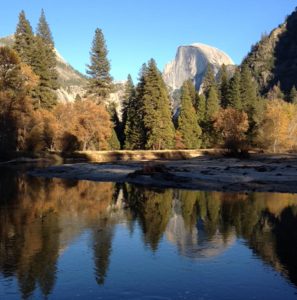
Half Dome

The Merced River
There is a spirit here — a spirit that (or who) inspires big ideas.
Today is a big day. Today is Election Day (outcome yet to be determined); but this piece is not about the election. It is about something much bigger: It is about you and me, you know, America. In the 1830s, Alexis de Tocqueville defined America as “the great experiment in democracy on the North American continent” with grand, historic intentions. And, as I mentioned, America — that is, you and me — is much more than elections; and it is also much more than the good intentions that initiated that great experiment. Henry Ford once famously said, “You don’t build a reputation on what you are going to do” (I read it on my tea bag this morning). We are what we do; and that’s how we must be remembered.
So, what have we done? “We” — that is, America before you and me — built a nation on some important ideas that had been brewing in Europe for quite some time, and “we” applied those ideas in an experiment. “We, the People,” applied them to the lives of some of the people who lived on this continent; allowed lots of people from around the world to come here to participate; and actually welcomed many of them — not all of them, and some more than others. And, while we were doing that, “we” (again, before you and me arrived on the scene) “we” built great things on those big ideas:
- government institutions,
- institutions of justice and law,
- practices in support of banking and commerce,
- transportation systems,
- foundations to encourage the arts and sciences,
- technology to change the world over and over,
- systems to enable a historic level of prosperity,
- traditions for how we treat one another,
- and much more.
Along the way, we fostered an adventurous spirit that expanded the great experiment — America — across the length and breadth of the continent and, by doing all that, we built a reputation that influenced the lives of people around the world.
Yes, that was a lot of doing on which to build a reputation.
Now, granted, the expansion across the continent incorporated/appropriated a lot of land and resources that had for a long time ‘belonged’ to other people; and, granted, the prosperity we created was made available to some of us and not others; and the worldwide influence America wielded resulted in both good and ill; BUT …
Here we stand today — standing on the shoulders of giants (well, OK, some of them were giants and some of us made it to their shoulders). Nevertheless, here we stand, here in the twenty-first century, you and me. We are the heirs of what has been passed down to us and the stewards of all that America IS.
So, now that American IS you and me (yours and mine), what have we done? And what are we doing?
Remember, this is NOT about the election, honest, I promised. Besides, we haven’t actually had the election yet — voting is still in progress cross the land as I scribble these words here beside the river; but we have been doing some things as stewards and owners of America — “We the People,” collectively — that really do define the time in which we live and the variety of experiences that we are all having. Those of us who read and listen have been hearing a lot of the details by which the news media keeps score of how we are doing:
- more people are employed today than were working a year or two ago,
- the average income of Americans has increased gradually in the past year or two,
- the stock market, although fluctuating with the news cycle, is at an all-time high,
- our achievements in science and technology are breathtaking,
- there are more students attending American universities than ever before,
- and much more.
AND, as has always been the case, America and its institutions face more dramatic and difficult challenges than ever before:
- the benefits of American prosperity are shared unevenly, with more wealth at the top and more people at the bottom;
- people less fortunate need more help than ever;
- in spite of historic advancements by people of color throughout our society, more violent incidents of racial animosity are reported in the news almost every day, many of which include deadly encounters between law enforcement and minority citizens.
One observation every American seems to agree with is that “we” are more divided ever.
Technology enables our social interactions to be instantaneously and widely distributed — that’s both the good news and the bad news — allowing us to instantly distribute far and wide the most beautiful and the most vile ideas. We try to use that capability to help us discuss the collective decisions we have to make; and then we have elections — like today.
A famous line, attributed to several of our forebears reminds us that:
“Democracy is that form of government in which the people get the government they deserve.”
As we wait for the results of today’s election, we might well ask, what do we deserve? Whether we like it or not, I suppose we will see the answer to that question in the election returns. Will we all agree that we deserve what we get? Perhaps we will look to those who have gone before us for guidance. We have been warned about what we might deserve.
Thomas Jefferson: “I tremble for my country when I consider that God is just.”
So, do our forebears teach us what to do when we are disappointed? On that subject., one of the most important speeches of our time is remembered by only a few. After losing his challenge of the results of the Florida vote count (he lost by 533 votes) in a decision by the U.S. Supreme Court (on a 5-4 vote), Al Gore reminded us, on December 13, 2000, of the longstanding importance of the peaceful transfer of power:
“Let there be no doubt, while I strongly disagree with the court’s decision, I accept it. It has been resolved as it must be resolved, through the honored institutions of our democracy.”
This week, Al Gore spoke to a ‘get out the vote’ rally: “Every vote counts. Trust me on this.”
So, after listening to the rhetoric over the past few weeks, can we be sure that wisdom passed down to us about the ‘peaceful transfer of power’ will prevail at the end of this day?
So, how’d we do? Tomorrow will tell the story.
November 9, 2016
This morning, we took a walk from Yosemite Lodge across Cook’s Meadow to the bridge on the Merced River. A woman pointed up at a tree, “Look,” she said, “an American eagle!” Sure enough. There he was, perched high in a tree, his large white head turned to one side of his dark torso the way we always see him when he plays his role as the symbol of our nation. Question: was he here to bring a message of encouragement to us up here in the mountains or did he come here to escape what had happened down in ‘the world below?’ OK, silly question — he LIVES up here in the mountains and doesn’t much care what happens down in ‘the world below.’ But for us, the symbolism was strong.

An American Eagle
OK, so we learned what had happened yesterday down in the world below. It was a shock, to say the least. Some were asking, can we survive this? But, as I said, this piece of writing is not about the election. It asks the question – in light of where “we” have been and what we have done to get where we are today, what are we supposed to do now? Regardless of which way the course of human events takes us, what are our responsibilities going forward? Can “We the people” (you know, you and me, America) survive and prosper even when we make big mistakes and when things don’t go the way we had hoped?
Fortunately, there are optimists among our forebears who reach out from their own difficult days to offer hope to us in ours. Carl Sandburg is one of those. Below are words from his poem about what “the people” do in times of crisis.
The People Will Live On — Carl Sandburg, 1936
“The people will live on.
The learning and blundering people will live on.
They will be tricked and sold and again sold
And go back to the nourishing earth for rootholds,
The people so peculiar in renewal and comeback,
You can’t laugh off their capacity to take it.
In the darkness with a great bundle of grief
The people march . . . ‘Where to? What next?’ “
We have begun hearing from people who are concerned about the effects of yesterday’s outcome. A friend of mine, seriously depressed about yesterday’s news, told me in an e-mail that she decided that she must do something. Whining about our disappointment is not enough, she reasoned. She plans to volunteer where she might be needed to help mitigate the effects of what happened yesterday. Another friend told Gretta “I don’t know if I can get over this.” Gretta’s answer: “Maybe we’re not supposed to get over it. Maybe we have to accept it and find something we can do to help. People are going to need help.” Others have suggested that it is time to increase our contributions to organizations that can help those who are going to suffer from the news — immigrants, those who will lose their health care, kids in school programs that will be cut, those who receive necessary assistance from government programs threatened by yesterday’s news, those who had hoped that “we the people” would try to mitigate global warming — you know, you and me: America. There are many choices one can make. As a first step, we have decided to increase some of our contributions. These are some of our favorites: The American Civil Liberties Union, The Natural Resources Defense Council, Planned Parenthood, The Sierra Club, and The Yosemite Conservancy. Many other approaches are available — an organization that supports the homeless? A school district, maybe even one in another town? I suspect that we all have ideas to add to that list.
Yesterday, November 8, 2016, “We, the people” spoke in the form of 290 electoral votes; and today, “we the people” have the opportunity to speak in other ways as well.
Looks like some difficult times ahead for a lot of people.
What must I do to help?
What must you?
Download a PDF of this piece: where_to_what_next_convivio![]()
Decades We Have Known
(and one we’re still getting to know)

“Yes, here we are
right in the middle of it;
but what should we call it?”
Those of us who went to school around the middle of the 20th century were taught to understand the passing of time in distinct eras, each having its own character and name. For example, the thousand-year period called “The Middle Ages” was a characterized principally by ignorance and short life spans. Following that, it seems, the focus of history narrowed to individual centuries. The 15th century (roughly, 1450 to 1550) is remembered for its intellectual and artistic awakening and discovery and thus called “The Renaissance.” Today, our understanding of distinct definable time periods comes down roughly to decades, both in our education and in popular culture.
So, as I read the news and listen to the pundits of our day, as they attempt to identify the trends of our times, I am driven to ask:
- given the pattern of the decades we have come to know best, what name would a thoughtful person give to the decade in which we live today? How will the 2010-2020 decade be remembered in the years to come?
Of course, since this decade is not finished, our judgments must be preliminary. But let’s give it a try. As a start, let’s review the decades of the most accomplished and truly “American” century of them all, the 20th century.
1900 to 1910 — “The Good Years”
During the first ten years of the 20th century, from an American point of view, the world was mostly at peace. Shirts cost 23¢, but the children who made them earned a mere $3.54 a week. Teddy Roosevelt proposed to strengthen the U.S economy with his Square Deal and sent the U.S. Navy around the globe to introduce the world to the idea of American power. My grandparents, like 3 million other immigrants escaping a crushing depression in Southern Italy, sailed in the belly of big ships from Naples to New York. Last but not least, my father rounded out the decade by being born in Red Jacket, West Virginia on October 10, 1910.
For many Americans, according to a commentator of that time (John Clark), “The future was simple; rewards would go to the virtuous” and Americans perceived themselves to have “the personal material out of which a millennium would grow.” Historians have called this decade “The Good Years” (see Walter Lord’s “The Good Years,” Harper and Row, 1960).
1910 to 1920 — “The End of Empire, War in Europe”
A powerful worldwide upheaval began. In America, much of the population moved to cities and there was a dramatic reduction in immigrants from Europe compared to the mass migration of the previous decade. The world began to see the end of a long-established world order, disintegrated into World War I, and suffered the historically unprecedented destruction and loss of life that went with it. A “new world order” was established once “the war to end all wars” finally … well, so we claimed … ended war itself and, in America, ushering in …
1920 to 1930 — “The Jazz Age” (or “The Roaring Twenties”)
This decade began, inauspiciously, on January 16, 1920 with the onset of Prohibition. It is hard to accept that the alcohol-marinated events of “The Jazz Age” could possibly have begun with a national decision to prohibit alcohol consumption; but as Will Rogers famously said, “Prohibition is better than no alcohol at all.”
Songwriter and philosopher Jacques Brel summed up ‘The Twenties’ this way:
“We must dance because the Twenties roar,
The Twenties roar because there’s bathtub gin,
Vo-de-oh-do and the road to sin,
The road to whoopee and a whole lot more.
Charles A Lindberg, tons of confetti,
Dempsey, Tunney, Sacco and Vanzetti
Black, Black Monday and the market drops
But we keep on dancing, dancing, we can’t stop.”
For many Americans, the party didn’t stop, until …
1930 to 1940 — “The Great Depression”
On the day the Jazz Age ended, the Thirties began: October 29, 1929, with the stock market crash and the beginning of the Great Depression. Unemployment and bread lines became the dominant images. Across the Atlantic, the world darkened further with the growing power of Fascism and Nazism in Europe and the pervasive fear that all of Europe would plunge into war again. The lights went out, virtually worldwide, for the better part of the decade, until …
1940 to 1950 — “World War II, Victory, The Seeds of Prosperity”
The Forties arguably began on September 1, 1939 with Hitler’s invasion of Poland, formally starting World War II. Many Americans, led by Charles Lindberg and other vocal isolationists, insisted that America should stay out of the troubles in Europe and focus on our own economic challenges. While most remember December 7, 1941, as the day that got America into the war, it was actually December 11 – the day that Hitler declared war on the U.S. and Russia. That gave President Roosevelt the clear justification to actively enter the war. The disastrous unemployment of The Great Depression was “solved” with the massive ramp-up of industrial production to support the war effort, which put Americans back to work (although the war killed 60-80 million people worldwide.
1950 to 1960 — “Stability, The Cold War, and Prosperity … for Most of Us”
Looking back as someone born in 1950 into a middle-class community, the Fifties was a period of stability and order, a large-scale expansion of the American middle class, and the re-establishment of a calm and mostly prosperous domestic life for much of America that hadn’t really been seen since the start of the century. A new brand of celebrities like Allen Ginsberg and Maynard G. Krebs introduced Americans to the new vocabulary of “The Beat Generation.” But …
The Cold War started. It began with the Berlin blockade on June 24, 1948, or maybe with the establishment of NATO on April 4, 1950, or perhaps with Joseph McCarthy’s “Wheeling” speech on February 9, 1950. Domestically, the uneven (mostly white) prosperity of the Fifties, coupled with the return to ghettos of many returning U.S. soldiers, the Fifties surely germinated the seeds of the turmoil that burst forth in the next decade.
1960 to 1970 — “The Age of Aquarius”
The Sixties began with a sense of optimism and inspiration epitomized by the election of an eloquent and youthful president, but those hopes were dashed dramatically on November 22, 1963. While the polarization, cynicism, and youth rebellion often associated with the Sixties is traced back by many to the Kennedy assassination, the Era of Rock and Roll as well as much of the colorful wildness and anti-establishment post-Woodstock psychedelia and self-actualization associated with the the Sixties really didn’t come into full flower until the early 1970s. In the middle of the decade, discontent among those who did not benefit from the prosperous “normal” of the Fifties (i.e., African Americans) erupted violently in cities all across America as a reaction against brutal racism and income inequality. Others marched in the streets to protest a war that those who grew up in the Fifties did not understand; once they did understand it, they liked it even less. THAT Sixties was not colorful, prosperous, or peaceful (and 50,000 U.S. soldiers did not come home from that new war).
1970 to 1980 — “The Me Decade”
The Seventies really began on June 17, 1973, even though few people noticed at the time. Five associates of the Committee to Re-Elect the President (yes, known as CREEP) were apprehended while breaking into the Democratic National Committee Headquarters in the Watergate office complex in Washington D.C. In spite of efforts by the president to “make one thing perfectly clear,” one thing led to another and introduced some enduring phrases into the American lexicon: “The Plumbers Unit,” “The people need to know that their president is not a crook,” articles of impeachment, a resignation, and, perhaps most lastingly, the suffix “-gate.” Some would argue that American politics would never be the same. Others argued that “the same” was exactly what it was … and continued to be.
1980 to 1990 — “The Beginning of Fact-Free American Politics”
The Eighties began on January 20, 1981, minutes after the presidency had passed from Jimmy Carter to Ronald Reagan and Iran released the 52 Americans who had been held hostage for 444 days. The decade that followed featured the distortion of American conservatism, from a moderate notion of limited government (actually practiced by Republicans from the 1950s through the era of Watergate) to the excessive expansion of government under the Reagan administration. (Surprised? Look up the numbers – highest Federal budgets per GDP, most Federal employees in history, widespread international intervention, etc.). And all of this took place amid the simultaneous “Small-Government” rhetoric of…well…Ronald Reagan.
1990 to 2000 — “The Best Decade Ever” (so reported by the WSJ and the NYT)
The Nineties were characterized by the rise of multiculturalism, the collapse of the Soviet Union, and the spread of capitalism in that vacuum. In American politics, the Nineties were dominated by a battle between the centrism of the Clinton administration and the politics of personal destruction perfected by the other party, later named RINO by the fictional Will McAvoy of Newsnight (for “Republican In Name Only”). The American economy grew at a strong 4%, median household income rose by 10%, the poverty rate fell from 15% to 11%, the U.S. murder rate declined by 41%, the federal government ended the decade with a budget surplus, the Stock Market quadrupled in value, and the wearing of neckties in offices began to diminish. But,
On the world stage, wars broke out in the Congo, the Persian Gulf, Chechnya (twice), Kashmir, Kosovo, Yugoslavia, Croatia, and Bosnia, to name only a few, and a host of civil wars redrew maps on at least two continents. However, apartheid in South Africa came to an end. The Nineties also featured an unprecedented explosion of the Internet and computer technology (although these advances were soon to be dwarfed by a greater explosion of the Internet and computer technology just around the corner).
2000 to 2010 — “The Rise of Terrorism and The Great Recession ”
The Oughts, the first decade of the 21st century was initiated by the arrival of large-scale terrorism on American soil. This heinous crime was followed by a panicked attempt to combat terrorism through the dismantlement of civil liberties at home and a misdirected military response against a country and a dictator who had nothing to do with 9/11.
Oh, yes, the U.S. had a historic period of anti-intellectualism, manifest in the depletion of education budgets and leadership of a president “misunderestimated” for his lack of interest in intellect, let alone possession of it (stimulating an all-but-forgotten quote from Garrison Keillor: “Who needs a fifty-dollar haircut on a fifty-cent head?”).
The housing finance and stock market investment disaster during the Dubya era sent the U.S. economy into a tailspin. Recession and unemployment were stopped just short of a Depression by an infusion of fiscal stimulus and government regulation (who wouldda thunk it?).
2010 to 2020 — “Whah?”
Well, that brings us to the present decade, of which we stand approximately in the middle and the question that I started with:
• What should we name this decade? More precisely, what are we likely to call it when this decade is done? So, let’s explore what we know about this current decade, so far.
The ?????
- The West’s war against terrorism becomes terrorism’s war against The West.
- The end of “carefree” in America and the avoidance of crowds.
- A generalized paranoia, growing gun ownership, and gun violence.
- A gradual, but dramatically uneven increase in prosperity.
- A decline in the power of labor unions and a decrease in the size of the middle class.
- The re-emergence of racial tension, especially between minorities and law enforcement.
- The maturing of “Fact-Free Politics” and the trend toward “voting against” in which nobody believes fully in the available choices.
• I invite you, dear reader, to send us your suggestions. What should we call this decade we inhabit today? I am interested in your ideas. ![]()
Download a PDF of this post: convivio_decades_sept2016_final
For fun, below is an added bonus for those who, like me, identify decades with music …
The Soundtracks of the Decades
(The most popular songs listed on U.S. Billboard)
The Tens:
When You Were Sweet Sixteen (1900)
Stars & Stripes Forever (1901)
Bill Bailey (Won’t You Please Come Home) (1902)
In the Good Old Summer Time (1903)
Sweet Adeline (1904)
Give My Regards to Broadway (1905)
Yankee Doodle (1905)
Auld Lang Syne (1907)
My Gal Sal (1907)
Take Me Out to the Ball Game (1908)
I Wonder Who’s Kissing Her Now (1909)
Swing Low, Sweet Chariot (1909)
The Teens:
Let Me Call You Sweetheart (1910)
By the Light of the Silvery Moon (1910)
Alexander’s Ragtime band (1911)
When Irish Eyes Are Smiling (1913)
By the Beautiful Sea (1914)
Carry Me Back to Old Virginney (1915)
I Didn’t Raise My Boy to Be a Soldier (1915)
O Sole Mio (My Sunshine) (1916, Enrico Caruso
Over There (1917)
For Me and My Gal (1917)
Rock-A-Bye Your Baby (With a Dixie Melody) (1918)
I’m Always Chasing Rainbows (1918)
The Twenties:
Swanee (1920, Al Jolson)
My Man (1922, Fannie Brice)
Yes! We Have No Bananas (1923)
Rhapsody in Blue (1924. George Gerschwin)
California, Here I Come (1924, Al Jolson)
Sweet Georgia Brown (1925)
Ain’t She Sweet? (1927)
Stardust (1927, Hoagy Carmicheal)
Ol’ Man River (1928)
Mack the Knife (1928)
Ain’t Misbehavin’ (1929)
Tip Toe Thru’ The Tulips With Me (1929)
The Thirties:
Happy Days Are Here Again (1930)
Dream a Little Dream of Me (1931)
It Don’t Mean a Thing (If It Ain’t Got That Swing) (1932, Duke Ellington)
Stormy Weather (Keeps Rainin’ All the Time) (1933)
Brother, Can You Spare a Dime? (1932, Bing Crosby, others)
On The Good Ship Lollipop (1935, Shirley Temple)
Summertime (1936, Billie Holiday)
They Can’t Take That Away From Me 1937, Fred Astair)
Blue Moon (1935)
Sing, Sing, Sing (With A Swing) (1937, Benny Goodman)
September in the Rain (1937)
Thanks For the Memory (1938, Bob Hope and Shirley Ross)
Over the Rainbow (1939, Judy Garland)
God Bless America (1939, Kate Smith)
Back in the Saddle Again (1939, Gene Autry)
The Forties:
When You Wish Upon a Star (1940)
In the Mood (1940, Glenn Miller)
Blues in the Night (1942)
White Christmas (1942, Bing Crosby)
As Time Goes By (1943)
Don’t Fence Me In (1944, Bing Crosby)
This Land is Your Land (1944, Woodie Guthrie)
The Christmas Song (Chestnuts Roasting on an Open Fire) (1946, Nat King Cole)
Some Enchanted Evening (1949, {Perry Como)
All I Want For Christmas is My Two Front Teeth (1949 Spike Jones)
Rudolph, the Red-Nosed Reindeer (1949, Gene Autry)
La Vie En Rose (1949, Edith Piaf)
The Fifties:
How Much Is That Doggie in the Window (1953, Patti Page)
Mister Sandman (1954, The Chordettes)
Sh-Boom (Life Could Be a Dream) (1954, The Crew-Cuts)
Three Coins in the Fountain (1954, Four Aces)
Mambo Italiano (1954, Rosemary Clooney, yep George’s mom)
Stranger in Paradise (1954, Tony Bennett)
Sixteen Tons (1955, Tennessee Ernie Ford)
Rock Around the Clock (1955)
Heartbreak Hotel, All Shook Up, Hound Dog, Don’t Be Cruel (1956, Elvis Presley)
Que sera sera (Whatever will be will be) (1956, Doris Day)
At the Hop (1957)
It’s All in the Game (1958, Tommy Edwards)
Johnny B Goode (1958, Chuck Berry)
All I Have to Do is Dream (1958, Everly Brothers)
Venus (1959, Frankie Avalon)
The Sixties, Seventies, Eighties, Nineties, Oughts, etc
YOU KNOW THESE, DON’T YOU?
For a these songs and more – check out: http://tsort.info/music/ds1930.htm
Click here to download a PDF of this post: ConVivio_Decades_SEPT2016_FINAL
Where Do I Start? Where Do You?
“Unless someone like you
cares a whole awful lot,
nothing is going to get better.
It’s not.”
— Dr. Seus
This week in Dallas, in the depth of despair, once again, we heard the President of the United States tell us that we must reject the despair we see all about us. He said, “Scripture tells us that in our sufferings, there is glory, because we know that suffering produces perseverance; perseverance, character; and character, hope. Sometimes the truths of these words are hard to see. Right now, those words test us because the people of Dallas, people across the country are suffering.”
Words of hope — but the words are hard to hear. Despair and suffering speak with loud voices that can drown out words of hope, making it difficult to move past suffering and get all the way to “perseverance and character” before getting to hope.
And he said, “I understand. I understand how Americans are feeling. But Dallas, I’m here to say we must reject such despair. I’m here to insist that we are not as divided as we seem. And I know that because I know America. I know how far we’ve come against impossible odds.”
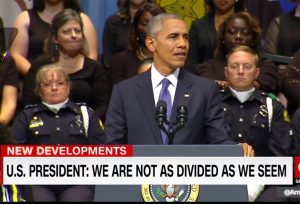
A big challenge — bold words delivered to an audience in mourning. He told us things we know, but things that are hard to hear while we’re in the middle of the suffering.
And he said, “The pain we feel may not soon pass, but my faith tells me that they did not die in vain. I believe our sorrow can make us a better country. I believe our righteous anger can be transformed into more justice and more peace. Weeping may endure for a night but I’m convinced joy comes in the morning.”
He reminded us of the promises made to Ezekiel I the old testament: “ ‘I will give you a new heart,’ ” the Lord says, ‘and put a new spirit in you. I will remove from you your heart of stone, and give you a heart of flesh.’ ” The President cited examples of those with such new hearts who had made progress possible, right here in Dallas. But still, we mourn.
Much earlier in my lifetime, a man I admired (who would not become president) stood on a street corner on the back of a flat-bed truck and talked about a terrible thing that had happened that day. Robert Kennedy told a small gathering of Africa Americans in Indianapolis that Dr. Martin Luther King Jr. had just been murdered. What was promised that day was wisdom, the same promise made to Ezekiel.
Quoting an ancient Greek playwright, Senator Robert Kennedy said,

“Even in our sleep, pain, which cannot forget
falls drop by drop upon the heart until,
in our own despair, against our will,
comes wisdom
through the awful grace of God.
— Aeschylus
Paste into your browser and watch:
https://youtu.be/GoKzCff8Zbs
The pain that day did not go away, nor — as of this writing — has the promised wisdom arrived. In fact, two months later, June 6, 1968, two days before my high school graduation, Robert Kennedy was himself the victim of violent hatred. That was 48 years ago. And, across this nation, still we have not yet seen the wisdom nor the new heart.
What do we learn? If we’re paying attention, we earn that waiting for the wisdom and the new heart has not worked. I suppose that means that we have to do it ourselves, somehow. And, this week, we heard some suggestions – President Obama said,
“we can learn to stand in each other’s shoes and look at the world through each other’s eyes.”
And he said, “we can abandon the overheated rhetoric and the oversimplification that reduces whole categories of our fellow Americans, not just to opponents, but to enemies.”
And he said, “those protesting for change will guard against reckless language going forward.”
And he said, “police departments will acknowledge that, just like the rest of us, they’re not perfect. That insisting we do better to root out racial bias is not an attack on cops, but an effort to live up to our highest ideals.”
And he said, “we can worry less about which side has been wronged, and worry more about joining sides to do right.”
And, to bring us back to where he started, he said, “It turns out we do not persevere alone. Our character is not found in isolation. Hope does not arise by putting our fellow man down, it is found by lifting others up.”
These prescriptions for change sound simple. But, with the number of times we have tried to teach ourselves these lessons, and failed — that’s where the despair comes from — one can only hope that these things do not turn out to be impossible.
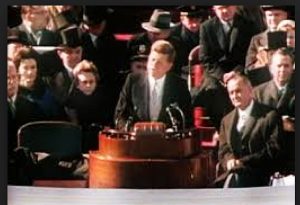 BUT, if we can persevere, we have been offered hope. Also in my lifetime, we were given another list of prescriptions for change that seemed daunting in their time. On January 20, 1961, President John F. Kennedy confronted the nation with such a list and summarized the challenge this way:
BUT, if we can persevere, we have been offered hope. Also in my lifetime, we were given another list of prescriptions for change that seemed daunting in their time. On January 20, 1961, President John F. Kennedy confronted the nation with such a list and summarized the challenge this way:
“All this will not be finished in the first one hundred days. Nor will it be finished in the first thousand days, nor even perhaps in our lifetime on this planet. But let us begin.”
Maybe the success is in the starting, not in the finishing. I suppose the “us” these leaders spoke of must be assembled one person at a time. So, where do I start? Where do you?
What answers can we offer? Even if they see too small and the challenges seem too great, let’s say them right out loud. “… let us begin.”
Download a PDF of this article: ConVivio_Dallas_July14_2016
![]()
An Election (Certainly Not Ours) — A Fable
“It’s what I DO.”
— Farley Forlock, July 2060
Click here for PDF of this post: THEIR_election_July7_2060
Not so long ago, in a country not far away, leaders of its two political parties began gearing up for their usual five-year election cycle. Halfway through the twenty-first century, the nation of Aqualandia had become justifiably proud of its new government structures. Years ago they had lengthened the presidential term to five years because, they observed, it took nearly two years to elect a president with the result that very little actual governing got done. Some elections early in the century, notably the infamous election of 2016, had been more chaotic than they preferred, so they took action to restore order and propriety to the process. After cleaning up the mess caused by the disintegration of one of the major parties, they established rules covering every eventuality: rules to qualify candidates for the national primary (they had to have significant name recognition in all three states as determined by well-regulated polling); rules ensuring that all Aqualandian residents could vote after passing a simple advertising-susceptibility test (to make sure voters would be properly informed by political advertising); rules awarding all thirty-three electoral votes from each of the three states to the candidate winning the popular vote in that state, and rules governing the three carefully timed steps to the election of a president. “The Institution,” as the rules were lovingly called, was universally admired around the world, especially in the remaining three nations of the European Union where Aqualandian principles were closely observed and often imitated.
The Three States
 After many decades of experimentation with a larger number of states, Aqualandia’s Institutional Convention structured the nation into three regional states. Every ten years, the national census would adjust the boundaries of the three states. By law, the Coastal Region, geographically split because of the propensity of the coastal areas to be influenced by “non-continental” forces, was drawn to include thirty-three percent of the registered residents who lived closest to the two coasts. The Central Region included the thirty-three percent of residents who lived between the two inland edges of the Coastal Region extending south from Aqualandia’s northern border. The Southern Region was made of the thirty-three percent of residents closest to the southern border between the Coastal and Central states. Since those three states added up to ninety-nine percent of Aqualandia residents, those citizens whose wealth placed them in the top one percent do not vote in the primary election. The logic held that those among the ‘one percent’ are less likely to be influenced by political advertising and, therefore, do not qualify as primary voters. In an Institutional provision called the Manhattan Compromise, this disparity was remedied by requiring each ‘one-percenter’ to vote twice in the general election, since they had been unrepresented in the primary process. Their campaign contributions supplemented their participation and were considered ample recompense for their sacrifice.
After many decades of experimentation with a larger number of states, Aqualandia’s Institutional Convention structured the nation into three regional states. Every ten years, the national census would adjust the boundaries of the three states. By law, the Coastal Region, geographically split because of the propensity of the coastal areas to be influenced by “non-continental” forces, was drawn to include thirty-three percent of the registered residents who lived closest to the two coasts. The Central Region included the thirty-three percent of residents who lived between the two inland edges of the Coastal Region extending south from Aqualandia’s northern border. The Southern Region was made of the thirty-three percent of residents closest to the southern border between the Coastal and Central states. Since those three states added up to ninety-nine percent of Aqualandia residents, those citizens whose wealth placed them in the top one percent do not vote in the primary election. The logic held that those among the ‘one percent’ are less likely to be influenced by political advertising and, therefore, do not qualify as primary voters. In an Institutional provision called the Manhattan Compromise, this disparity was remedied by requiring each ‘one-percenter’ to vote twice in the general election, since they had been unrepresented in the primary process. Their campaign contributions supplemented their participation and were considered ample recompense for their sacrifice.
The fact that the census changed the shape of the three states every ten years caused an ongoing joke, especially popular among Europeans and late-night talk-show hosts. The map of Aqualandia was drawn to look, alternately, like a smiling face or a frowning face, depending on the population distribution. The current host of the CBS Late Night Show said, “to get this nation smiling again, fifty million people will have to move north.”
The Two Parties
Aqualandia’s history had shown that any deviation from a two-candidate election distorted the election process and its outcome. In previous centuries, third-party candidates like George Wallace, John Anderson, and Ross Perot were found to have splintered the natural ideological distribution of the nation in ways that appeared to subvert the will of the people. So, that eventuality was prohibited. The Institutional Convention called for exactly two political parties. While there were no regional requirements for party membership, the Blue Party found its members predominantly located in the Coastal Region. The Red Party dominated the Southern Region to a large extent. The Central Region was typically found to be divided between the Blues and Reds from election to election in less predictable patterns, as were the one-percenters.
The Three Steps in Electing a President
Step One required candidates to qualify for the primary ballot in their state by uploading their name-recognition data to the secure election website using a specially designed PresElect App downloaded from iTunes. After six months of streaming YouTube, Snapchat, and TechPol appearances, that same PresElect App was used by voters in a national same-day primary election to select the candidate who would represent their party in the general election.
Step Two required party leadership to meet with the nominee to establish the priorities, policies, and values that all party members would support in ‘down-ballot’ races for the Senate, House of Representatives, the three Governorships, and local elections. ‘One-percenters’ of both parties were included among the leadership of the party of their choice, ensuring that party platforms would not violate market-based business practices.
Step Three, of course, was the general election. Given the way the intellectual competence of the electorate had evolved in recent years, it needed to be the simplest step. With only two candidates to consider and two publically-debated policy platforms to choose from, how hard could it be? It was designed to be orderly, simple, and easy to understand (even in the Southern Region). However, this particular year, 2060, has all the earmarks of being . . . well, different.
The Candidates
After a messy primary season, one candidate from The Red Party emerged with the most votes – even though nobody in the party could stand being in the same room with him. Farley Forelock appealed to voters who were unhappy with government (sort of everyone) and by insulting everyone who didn’t agree with him (sort of everyone). In his youth, he had attended a little-known university in pursuit of a double major in marketing and law (specializing in bankruptcy law). While there was no record of a degree, he learned a lot from his mentor, the founder of the university. Farley went on to make a fortune in the construction business with bombastic marketing (“We’re the best and THEY are terrible!”) and minimizing construction costs by paying as little as possible for labor and materials (“Some of our nation’s laws can be very friendly if you know how to use them”). In an undergraduate course in election law, Farley recalled writing in his notebook, “If a person is successful enough to be a credible candidate for president, why would he or she want to actually BE president? It seems like a lot of work. All I’ve ever really wanted to do is WIN!”
The Blue Party primary season was also messy. The winning candidate, Ophelia Empath had long experience in various governmental roles at a sufficiently high level to make her nomination inevitable. Her candidacy, however, was a two-edged sword. On the one hand she appealed to many Blue voters because she had high-level government experience; but she was detested by the category of voters in both parties who were unhappy with government (sort of everyone) and held her accountable for the status quo. She also had the disadvantage of being part of a political family that had a well-earned reputation for personal controversy. So, voters who sought stability were wary of a candidate who was always followed around by high drama.
Many Aqualandians were anxious to vote AGAINST both candidates. It was harder to identify many who were enthusiastically FOR either of them.
The Winning Strategy
Farley Forelock had been studying the government of Aqualandia for some time and had formulated a plan. He observed that the people did not seem capable of selecting a president who was up to the job. The increasing distaste for government and a diminishing participation in it seemed to be making that condition worse. He reasoned that somebody had to choose a president who would put the government on a stronger path. “If only I could just choose someone … “ How to do that?
Farley had made some simple observations:
- The Red Party candidates likely to run against him were weak. There were so many of them, they would divide what little support they could generate.
- Red Party voters were willing to engage in a blame game if they were persuaded by the right kind of nationalist cheerleader.
- The Blue Party candidate was surrounded by potential land mines that could derail her candidacy. A clever opponent could win if he was willing to play hardball.
- Presidents in his lifetime had entered office as vigorous men in the prime of their lives and left it as grey-haired, aging, tired men. The job was a great burden. Who would want to DO such a job? The REAL power, he imagined, would be to unilaterally select the right president and bypass the burden of office.
Using his previous theatrical experience, Farley decided to play the part of a bigoted buffoon, inciting large crowds to fear and distrust people of different backgrounds. He predicted that the undereducated population at the bottom half of the economic spectrum would blame their lack of success on others. He also reasoned that they would not be interested in the complicated analyses offered by the other party. So, he embarked on a campaign of insults, division, and over-simplification. In a party accustomed to over-simplification and finger pointing, it should be easy to win the nomination.
After the vote count, the outcome astounded everyone except Farley Forelock (“I told you I would WIN, that’s what I DO”). He was now the Red Party nominee. That was that.
Once he had won the nomination, it was time for Step Two: party unification, platform development, and the vice-presidential selection. This step was easy – he merely said “no” to every policy position the party leaders proposed and reminded them that the voters had spoken. In front of a bevy of reporters, he told them — if the party wanted to win, they had to agree with the positions he had supported during his successful primary campaign and accept his choice for vice-president. He assured them he would make his VP announcement soon. His message appeared in headlines in every newspaper in Aqualandia: “Do you want to win? Then stick with me, that’s what I DO!” Polls showed widespread support among the Reds. Party leaders had no choice but to nod their heads and wait for his VP announcement.
As he had predicted, the Blue Party nominee was lambasted for serious security violations during her government service. She didn’t go to jail but her credibility was damaged. Many public figures expressed diminished confidence in an administration headed by Ophelia Empath. So, while her name would remain on the ballot, voters began pulling away from her. That was the signal for Farley Forelock to prepare the final step of his strategy. He named his vice-president — a long-planned choice that emerged from his usual behind-the-scenes deal-making — on the last day to put a name on the three state ballots. He then flew to Scotland for an extended visit to one of his golf courses.
Everyone looked at each other – “Whuh just happened?!” Of course they couldn’t know what Farley Forelock had planned as Step Three – that would be the clincher. But that would have to wait until the proper time.
Election Day was fairly straightforward. The South and Central states both voted for Forelock, earning him 66 of the 100 electoral votes. As soon as those numbers were confirmed, the votes from Coastal Region were meaningless. One percenters were also irrelevant. Farley paused on the 13th green before putting for par. His Twitter feed from Scotland acknowledged the outcome “I told you I would win, it’s what I do.”
In fulfilling the formality required by The Institution, the electors met on December 19th to confirm the outcome. That was that.
Mystery swirled around Aqualandia’s capital in anticipation of Inauguration Day on January 20. Adding to the tension, President-Elect Forelock decided to stay overseas and conduct what was billed as a “Final Presidential Tour” of his golf courses and casinos, finalizing three deals, selling one property and buying two more. The press had questions that went unanswered – Would he be putting his properties and businesses in a blind trust as other wealthy presidents had done? Would he announce a new CEO of Forelock Enterprises? Would announce his cabinet soon? Would The First Lady begin remodeling and painting the exterior of the Presidential Estate, as he had promised, “on Day One?” However, Forelock’s usually productive Twitter account (#WEWIN) was silent. With impeccable timing, Farley’s plane touched down at JFK airport and the usual array of microphones on the tarmac awaited the new president’s first words. His orange hair blowing in the breeze, without a teleprompter, he scowled his usual scowl and said, “As I had intended from the start, I have selected the president of my choice. I hereby resign from the presidency effective immediately. The Vice President-Elect, now the President I have chosen, will be inaugurated on January 20. I accept the thanks of a grateful nation and wish the new president well.” ![]()
Thanks to Gretta for some of the key ideas and to Lauren for her Editorial expertise.
Download a PDF of this post here: THEIR_election_July7_16
It Can’t Happen Here
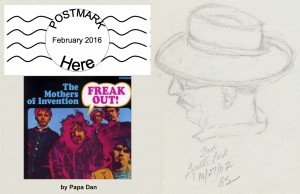
“Those who cannot remember the past are doomed to repeat it.”
— George Santayana
“I’ve got news for Mr. Santayana: we’re doomed to repeat the past no matter what. That’s what it is to be alive.”
— Kurt Vonnegut
Naw, Can’t Happen, Not Here
Now that we are within the last month of the 2016 election, I couldn’t resist the impulse to renew a “warning” that was written back in 1935. The temptation to write about the election has been strong. So, back in January, in the early days of the primary season, I wrote a column about the future of the Democratic Party. At the end of it, I cited a column by David Brooks about the future of the Republican Party. You probably noticed that neither of these were actually about the candidates; they are about a larger question about our political process. After posting that piece, I sat down to watch a series of interviews in which people who had attended the last Republican debate were asked what attracted them to the various candidates.
As I listened to what they liked about Donald Trump, it occurred to me that I had heard some of those messages before. Some wore hats that repeated his theme, ”Let’s make American great again.” They liked the fact that he wanted American to win more often – “We don’t win anymore. When I am president, we are going to win!” They cited his desire to restore what he considered “traditional American values” like order and corporate prosperity (“If we strengthen American corporations to they will bring profits back home”). They resonated with his interest in building a wall to keep them out but because they are coming here to do us harm. He blamed an incompetent and weak government in Washington, especially the Congress, for most of our troubles. They liked is plan to destroy our enemies. How? “We’ll carpet bomb them all,” he said. That all sounded familiar; I recalled hearing that somewhere before. But where?
And then I remembered.
For a high school book report, I read a novel recommended to me by my English teacher in 1966. It Can’t Happen Here is a 1935 novel by Sinclair Lewis, published during the rise of fascism in Europe. Let’s travel back to the world of that novel and see what happens, in the world of fiction, of course, when a fearful America elects an extreme charismatic corporate leader in a time of crisis.
An update –> Just this past week, four of us attended the stage adaptation of that novel at the Berkeley Repertory Theater. Although this play only slightly modified the details from the way the story was written in 1935, it was frightening in its similarity to the issues, characters, and divisions among Americans that we know so well in this 2016 election campaign. The story is a reminder — OK a warning — of what is at stake in this election. The play runs through November 6 (yes, two days before our own election day); so if you are interested, there is still time to see it. Here is my synopsis:
Back in time to the world of the novel
The novel describes the rise of Berzelius “Buzz” Windrip, a charismatic and power-hungry politician (patterned after an extreme corporate leader of the time). In the novel, Windrip runs for president of the United States and easily defeats Senator Walt Trowbridge and Franklin Delano Roosevelt, promising to restore the country to its former greatness and prosperity. He portrays himself as a champion of traditional American values. Foreshadowing some authoritarian measures that would emerge in the the fascist nations of Europe, Windrip reorganizes the US government — he rapidly outlaws dissent, arrests political enemies, and trains and arms a paramilitary force called the Minute Men, who terrorize citizens and enforce the policies of his “corporatist” regime. One of his first acts as president is to eliminate the influence of an ineffective Congress, which draws the ire of many citizens as well as the legislators themselves. The Minute Men respond to protests against Windrip’s decisions harshly, attacking demonstrators with bayonets to keep order, as he had promised. In addition to these actions, Windrip’s administration, known as the “Corpo” government, curtails the rights of women and minorities, and eliminates individual states by subdividing the country into administrative sectors managed by “Corpo” authorities. Those accused of crimes against the government are convicted in kangaroo courts presided over by Windrip’s hand-picked judges.
Despite these dictatorial measures — and this was not credible to my adolescent mind in 1966 — a majority of Americans in the novel approved of these policies, seeing them as necessary but painful steps to restore American power. Crowds cheered. Others, those less enthusiastic about the prospect of “corporatism,” calling themselves conservatives, reassure each other that fascism “cannot happen here.”
The novel foretells the results of electing a charismatic leader who offers these kinds of simple solutions to difficult problems. In time, Windrip’s hold on power weakens as the economic prosperity he promised does not materialize and many Americans, including many of the supporters who helped him gain power, flee to both Canada and Mexico. Chaos ensues as former supporters return to overthrow him, replacing him with weak government, creating a power vacuum, and a violent coup. New leaders try to restore popular support and patriotism by launching an unjustified invasion of Mexico, using mass conscription. Riots and rebellions break out across the country, with many realizing that they had been . . . misled. The novel ends with the outbreak of civil war and an underground movement emerging from occupied portions of southern Minnesota.
Minnesota?!
Back in the “Real World”
In 1936, back in the “real world,” a stage version, also titled It Can’t Happen Here,[5] premiered simultaneously on October 27, 1936 in 21 U.S. theatres in 17 states[6], in productions sponsored by the Federal Theater Project, a New Deal agency of WPA. A film version was in preparation at MGM, but studio head Louis B. Mayer canceled the production anticipating potential problems in the German market.
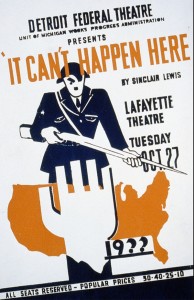
In 1982, an adaptation titled Storm Warnings was presented to NBC as a TV miniseries, but NBC executives rejected the initial version, claiming it was too cerebral for American audiences. To make the script more marketable, the American fascists of Windrip’s “Corpo” government were re-cast as man-eating extraterrestrials. The revised story became the miniseries V, which premiered in 1983. Other versions have appeared, with limited success and little of the intended influence.
Poster for the stage adaptation of It Can’t Happen Here,
October 27, 1936 at the Lafayette Theater.
Back to the 1960s, I went to the record store early in 1967 and bought a new album by a group called Frank Zappa and The Mothers of Invention. A very much “atonal” little song called “It Can’t Happen Here” got my attention. Click below to listen. The lyrics are below that.
Oh, and it won’t happen here.
Click to download this post in PDF: Cant_happen_here_ConVivio_OCT_update
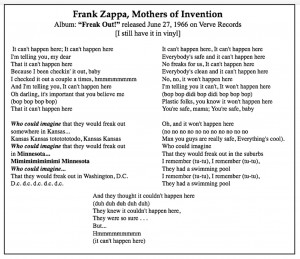
Epilogue: As I finished writing this piece, Gretta asked a pointed question that deserves an answer, “Aren’t we tired of all that yet? Isn’t there something more positive you can contribute?”
I will attempt to address that question in my next post – wait for it.
The Democratic Future, Views from 2005 & 2016

“The choice is fairly simple. It is a choice
between leading and following.”
— Dan Sapone
January 1, 2005
During the current early-primary political season, as I listen to the analyses of our current crop of pundits and campaign strategists, I have the feeling that I have heard some of it before. One of the key questions on the table, particularly regarding the future of the Democratic Party is this: which part of the political spectrum should the successful candidate “claim” as the basis for a path to victory. In simplistic terms, that spectrum spans a wide swath of territory from the “liberalism” of the far left to the “conservatism” of the far right. Since the middle of the 20th century, conventional political wisdom in America has held that either side of that divide must rely on some portion of the political center to supplement their own political base to win a national election. While our short-term focus here in the early weeks of 2016 is on the race for the nomination, that question applies directly to the general election in November. So, where have I heard this discussion before? Ironically it was in a column I wrote for the “New Century Muse” (no longer with us) on January 1, 2005 entitled “Finding Their Place: What Next for the Democratic Party?” Democratic_Future_2004
The Democratic Party faced this same choice after the 2004 election. In 2005, I wrote:
“In 1992, Bill Clinton and his strategists made the judgment that the country had moved to the right during the 12-year Reagan/Bush presidencies. Along with that judgment came the determination that Democrats could not win an election with a majority based on the left end of the political spectrum. So, to win a national campaign, Clinton reasoned that a majority must be found that includes as much of the center of the political spectrum as possible. So, the campaign strategy, and the subsequent election results, looked something like this.
This was an effective strategy in that it successfully isolated Republican candidates — George H.W. Bush in 1992 and the Bob Dole in 1996 — on the extreme right AND stranded the extreme left with nowhere to turn except Clinton (with the unpalatable third choice of Ross Perot). The good news for Democrats was that this strategy yielded a two-term Democratic presidency. The bad news was that it planted the seeds of the polarization we are experiencing today.”
That column from eleven years ago explained the details of how that happened. The most notable detail is that Clinton was beating Republicans on some of their own issues, attracting voters from that “Center.” What’s relevant today is that the “Center” that propelled Bill Clinton to two presidential terms in the 90s, does not exist today. Polls and recent experience tell us that there are not significant numbers of voters of either party who will cross the divide and vote for candidates of the other. So, in today’s polarized electorate, the winning strategy for any Democratic candidate for president in 2016 must look like the one predicted back in January of 2005. It will have to look like this:
To win both the Democratic nomination and the general election in 2016, any Democratic candidate must follow that old 2005 advice:
The choice is fairly simple. It is a choice between leading and following. Their task is to persuade a significant portion of the American people to follow Democratic leadership back to the left. In spite of the Clinton success of the 90s, a dispassionate analysis of that strategy was that it was a strategy to follow the perceived trend in the American electorate to the right. It was not a strategy to lead anyone. If Democrats are going to regain a position of influence in the U.S. government, they must stand up for their traditional core values and persuade Americans that those values are important. They must lead.
So, howya-gonna-do-that? Once again, let’s take a look back to 2005:
“Educating America
The central task is one of basic education. It does not take a terribly long memory to recall that, in the 1960s and 70s, the phrase “Christian moral values” meant basically one thing — in popular culture as well as in churches and synagogues: it meant taking care of the poor. Remember that Lyndon Johnson, before he got us mired in the Vietnam War, was a hugely popular and powerful Senator and President because he succeeded in painting the image of Republicans as uncaring toward poor and minority Americans. His Civil Rights Act and his “Great Society” legislation passed a reluctant Congress in part because it was portrayed from pulpits across American as the Christian and moral thing to do.So, what changed? The neo-conservative movement in America embarked on a brilliantly orchestrated and hugely successful “educational” campaign to redefine morality in America. The new definition of “Christian moral values” focuses on whether you support abortion rights and with whom you have sex. That definition, and the rhetoric that accompanies it, specifically excludes the question of taking care of the poor.
This re-definition was not difficult to do — and liberals helped. During America’s “neo-conservative re-education,” those who supported abortion rights failed to articulate their “Pro Choice” position as supporting poor, largely minority, pregnant teenagers who had no choices but back-alley illegal abortions and poverty. Anti-abortionists successfully labeled liberals who supported abortions as “baby killers.”
Campaign rhetoric and marketing surrounding gay and lesbian rights followed a similar path. Liberals failed to promote the idea that the right to marry is a basic building block of mainstream society. They could have argued that same-sex marriage would bring homosexuals into the mainstream of American life with all of the stabilizing forces and behaviors that strengthen communities. Instead, they allowed Republicans to associate their cause with particular sexual behaviors.
On economic issues, both religious and Democratic leaders simply failed to reinforce the connection between economic disparity and moral values, between the Bible and the Federal budget, and between tax policies and the widening gap between rich and poor. Republicans were free to define morality narrowly focused on marriage and abortion and ignore the morality of their economic policies.”
That’s what happened to get us where we are today. So, just as it was true in 2005, it is true today that the Democratic Party has work to do. If they are going to elect a president, whether it be a Bernie or a Hillary, and carry enough Democrats into the House and the Senate to actually implement progressive policies, they must lead. They will have to follow advice they were given eleven years ago:
“[It] must stand up for the distinctly American moral values that Americans have supported throughout their history and they must lead in the direction of basic human rights and economic justice. People will follow, Democrats and “Greens” alike, if Democrats do the hard educational work of reminding Americans who they are and what moral values have always meant to them.”
The bad news is that it may take awhile. The worse news is that there isn’t time. There is much at stake in 2016 – from the fate of the shrinking middle class to the long-fought-for human rights that the Supreme Court will certainly be called on to defend during the coming presidential term — and there is little doubt that the next president will shape the nature of that court for a generation. I hope that the candidates will exhibit the wisdom to promote these distinctly American values and resist the temptation to attack each other on the specifics. They must not lose sight of the reality that one of them must be elected president. The future depends on it.
Download PDF of this article: Democratic_future_ConVivioJan16
![]()
==========
Epilogue: Just as I finished this column about the future of the Democratic Party, I decided to write a parallel column outlining my view of the future of the Republican Party. Unfortunately, that same day, David Brooks (New York Times Op-Ed columnist and author) beat me to it. His column is found at:
http://www.nytimes.com/2016/01/19/opinion/time-for-a-republican-conspiracy.html.
I couldn’t have written it better myself. — DRS
